First Class Prejudice: How My Dad's Birthday Surprise Exposed Airline Discrimination
The Perfect Plan
My name is Emily. I'm 19 and a full-time college student with what I thought was the perfect birthday surprise. For weeks, Mom and I had been plotting in secret—harvesting Dad's frequent flyer miles to book me a first-class seat on one of his flights. He's a commercial airline pilot, and I wanted to do something special for his birthday this year. Every night, I'd stand in front of my dorm mirror in my nicest outfit (a professional-looking blazer, crisp blouse, and dress pants), practicing my greeting: 'Hey, Dad! Surprise!' I'd imagine his face lighting up when he walked through the cabin and spotted me sitting there in first class like I belonged. The anticipation was killing me! I'd grown up hearing his stories about the luxury of first class—the extra legroom, the plush leather seats, the premium service—and now I'd get to experience it myself while delivering the ultimate surprise. As the day approached, I could barely sleep, running through every detail in my head. What I didn't know was that my perfect plan was about to hit some serious turbulence.
 Image by RM AI
Image by RM AI
Countdown to Takeoff
The week before Dad's flight, I transformed into a planning machine. Every night after classes, I'd spread my notes across my dorm room desk, checking flight details and airport logistics like I was preparing for finals. Mom texted daily updates: "Your dad still has NO idea!" with way too many emojis. We spent hours on FaceTime debating my outfit—I needed to look mature enough that no one would question my presence in first class. We finally settled on my navy blazer with gold buttons, a cream silk blouse, and tailored black pants. "You'll look like a young executive," Mom assured me. I even practiced walking confidently in my low heels across my dorm room floor. At night, I'd lie awake imagining the moment—Dad's face when he spots me, that proud smile I've known my whole life. I rehearsed my greeting until my roommate threatened to move out if she heard "Hey Dad! Surprise!" one more time. I set three alarms on my phone, terrified of oversleeping. Everything was perfect on paper. But as the day approached, a weird knot formed in my stomach. What if something went wrong? What if he wasn't happy to see me? What if I didn't belong in first class after all?
 Image by RM AI
Image by RM AI
Morning of the Mission
I woke up at 5 AM on the day of Dad's flight, even though my first alarm wasn't set until 6. The butterflies in my stomach had apparently decided to start their day early too. I triple-checked my outfit hanging on my closet door, making sure there wasn't a single wrinkle that could make me look out of place in first class. Mom arrived at my dorm right on schedule, practically vibrating with excitement as she helped carry my overnight bag to the car. "Operation Birthday Surprise is a go!" she whispered dramatically as we pulled away from campus. The entire drive to the airport, we kept breaking into random fits of giggles like we were pulling off some elaborate heist. Mom insisted on dropping me off three hours early—"You never know with security lines these days," she said, though we both knew it was because neither of us could stand the suspense any longer. As we hugged goodbye at departures, she squeezed me extra tight and whispered, "Take pictures of his face when he sees you," her eyes misty with emotion. I promised I would, watching her drive away before turning to face the terminal with my boarding pass clutched tightly in my hand. I took a deep breath and walked through the sliding doors, completely unaware that in a few hours, this perfect plan would crash and burn in the most humiliating way possible.
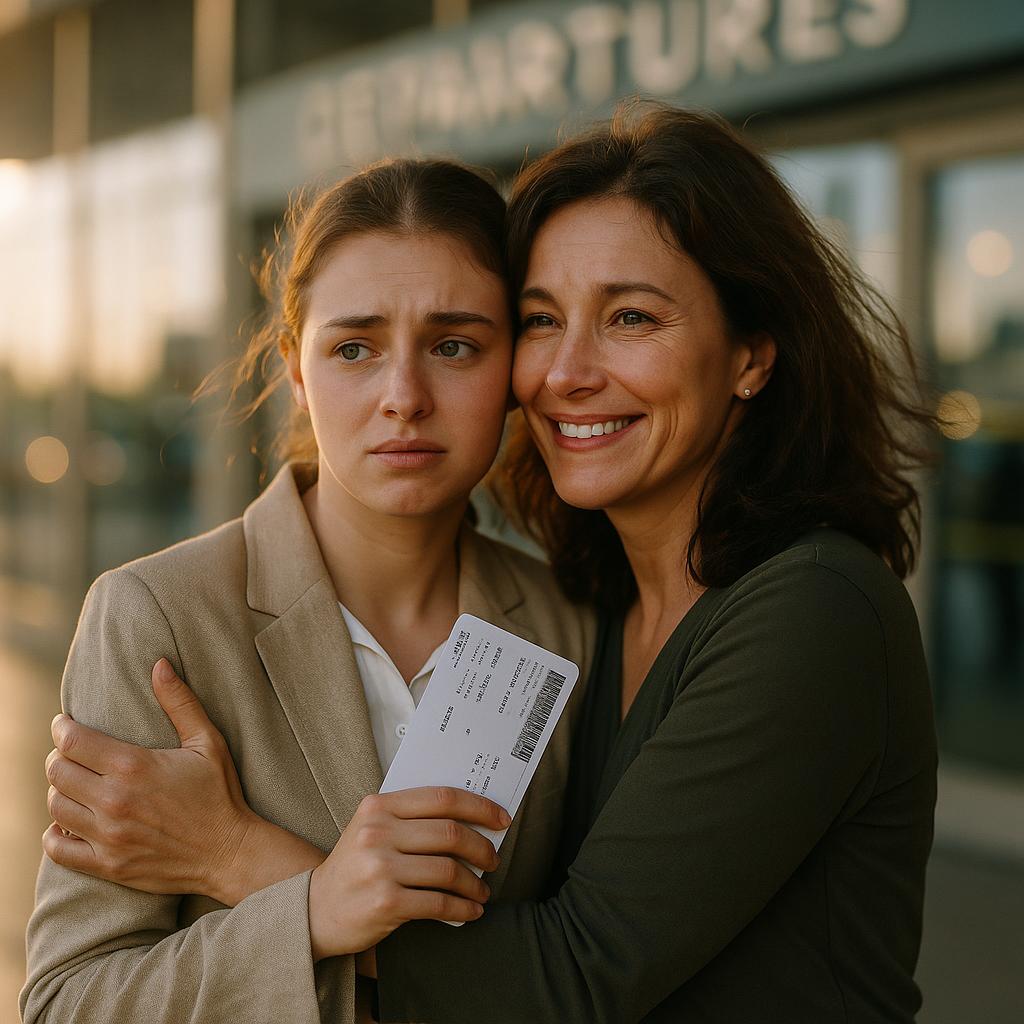 Image by RM AI
Image by RM AI
Airport Confidence
Walking through the airport felt like stepping into a new version of myself. I breezed through security with my ID and boarding pass ready before they even asked—no fumbling like a typical college student. The TSA agent actually smiled at me (a miracle in itself) as I efficiently removed my laptop and slipped off my shoes in one practiced motion. My blazer and silk blouse must have worked some kind of magic because people were treating me differently. In the terminal, I found myself surrounded by business travelers tapping on laptops and wealthy-looking couples discussing their vacation homes in the Hamptons. I straightened my posture and tried to look like I belonged among them, like first class was just my normal Tuesday. At the gate, I overheard a man in an expensive suit talking about his quarterly earnings call, and I nodded knowingly as if I understood corporate jargon. When the gate agent called for first-class boarding, I took a deep breath, clutched my boarding pass, and stepped forward with what I hoped looked like the confidence of someone who'd done this a hundred times before. "First class is this way," the gate agent said with a warm smile, gesturing toward the jet bridge. As I walked onto the plane, heart pounding beneath my professional facade, I had no idea that my carefully constructed confidence was about to be shattered in the most humiliating way possible.
 Image by RM AI
Image by RM AI
First Class Boarding
When the gate agent called for first-class boarding, I stepped forward with what I hoped was the confident stride of a seasoned traveler. 'First class is this way,' she said with a warm smile that made me feel like I belonged. Walking down the jet bridge, I mentally rehearsed Dad's surprised expression one more time. The flight attendant at the door greeted me with a 'Welcome aboard,' and I managed to respond without my voice cracking from excitement. Following her gesture toward the front of the plane, I entered the first-class cabin and—wow. Dad's stories hadn't done it justice. The seats were massive leather thrones compared to the economy seats I was used to. The cabin smelled like expensive cologne and fresh coffee, not the usual mix of fast food and too many people. As I found seat 2A by the window, I ran my fingers over the plush armrest and settled in, trying not to look too amazed by the legroom. A flight attendant offered me a pre-flight beverage, and I accepted a sparkling water, feeling like I'd infiltrated some exclusive club. I placed my phone on the wide armrest, ready to capture Dad's reaction. Everything was going perfectly according to plan—until I noticed a different flight attendant at the front of the cabin giving me a suspicious once-over that made my stomach drop.
 Image by RM AI
Image by RM AI
The Luxury Experience
I sank into the plush leather seat, immediately understanding why Dad had raved about first class all these years. The armrests were wider than my textbooks, and I could actually stretch my legs without kicking anyone's seat! A flight attendant with perfectly styled hair approached with a silver tray. "Pre-flight beverage?" she asked with a practiced smile. I ordered sparkling water, trying to sound like this was my normal Tuesday routine. As I sipped from the actual glass (not plastic!), I glanced around at my cabin-mates—mostly silver-haired executives typing importantly on laptops and couples with expensive watches discussing vacation homes. One businessman across the aisle was literally wearing cufflinks that probably cost more than my semester's textbooks. I felt like I'd snuck into some exclusive club where everyone had a secret handshake I hadn't learned yet. Still, the luxury was intoxicating—the smell of leather and premium coffee, the hushed conversations, the feeling of space. I settled deeper into my seat, practicing Dad's surprised face in my mind while trying not to look too amazed by the hot towel service. Everything was going perfectly according to plan—until I noticed a different flight attendant at the front of the cabin giving me a look that made my confidence suddenly evaporate.
 Image by RM AI
Image by RM AI
The Confrontation
I was just settling into my first-class fantasy when a different flight attendant approached, her face set in what I can only describe as professional suspicion. 'Excuse me, may I see your boarding pass?' she asked, her tone clipped and cold. My heart skipped as I fumbled to hand it over, suddenly feeling like I'd been caught shoplifting. She examined my ticket with narrowed eyes, flipping it over as if expecting to find 'FAKE' stamped on the back. Then came the question that made my stomach drop: 'How did someone your age afford a first-class seat?' Her voice was loud enough that several nearby passengers turned to stare. My face burned hot with embarrassment as I tried to explain, 'Actually, it's my dad's miles—he's the pil—' but she cut me off with a raised hand. The businessman across the aisle lowered his Financial Times to watch the spectacle. The couple behind me whispered something I couldn't quite hear. In that moment, my carefully constructed adult facade crumbled completely. I wasn't Emily the Sophisticated Traveler anymore—I was just a college kid who'd been caught trying to sit at the grown-ups' table. And what happened next would turn my perfect surprise into a public humiliation I never saw coming.
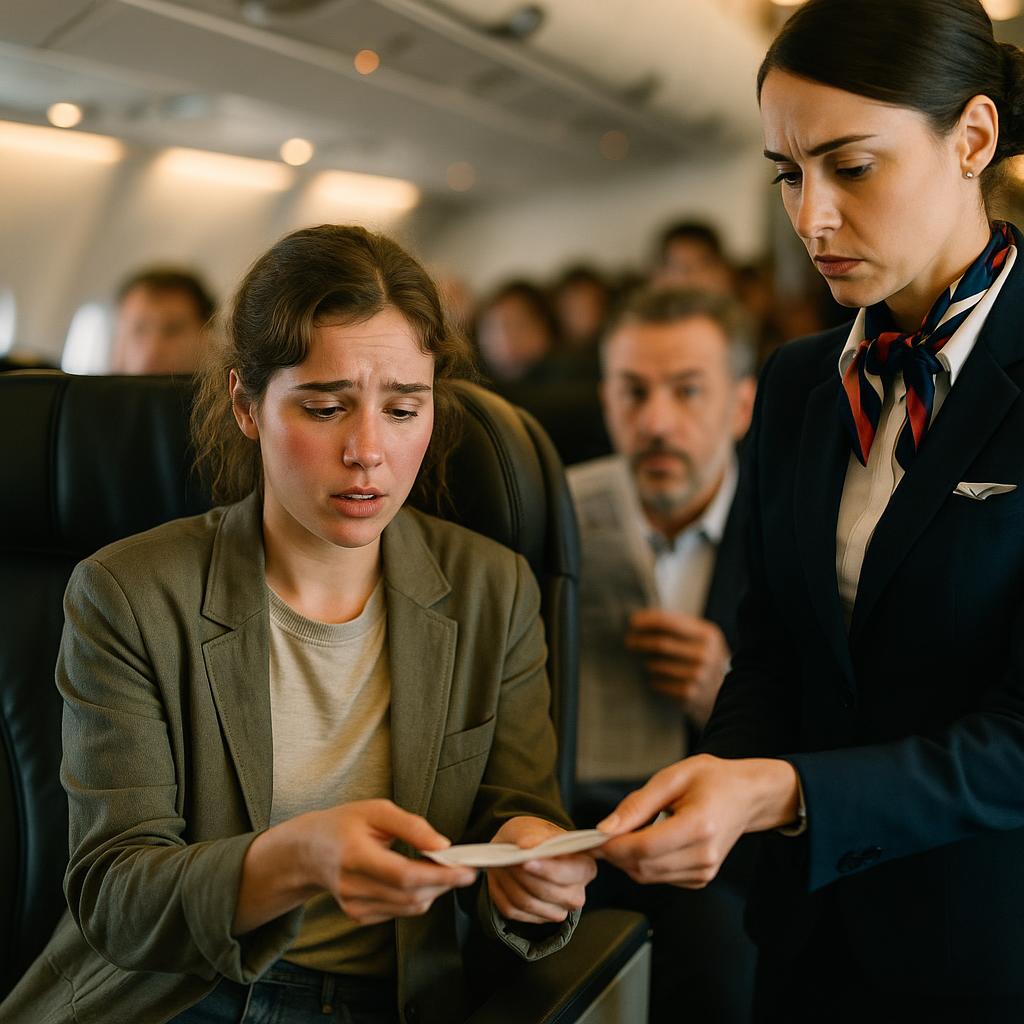 Image by RM AI
Image by RM AI
Attempted Explanation
"It's my dad's miles—he's the pilot of this flight," I tried to explain, my voice growing smaller with each word as the flight attendant's expression hardened. She cut me off with a dismissive wave of her hand, like I was a child making up an elaborate excuse for stealing cookies. "I've heard all kinds of stories from young people trying to sit where they don't belong," she said, loud enough for nearby passengers to hear. My cheeks burned hot with embarrassment. The businessman across the aisle peered over his glasses at me with a mixture of pity and secondhand embarrassment. I fumbled with my phone, desperately wanting to show her a photo of Dad and me, but my fingers felt numb with anxiety. "My father is literally Captain Reynolds," I insisted, my voice cracking. "He's flying this plane today." She gave me a look that screamed 'sure, honey' without saying a word. It was the same look teachers give when you claim your dog ate your homework. I could feel my carefully planned surprise crumbling around me as she stood there, arms crossed, clearly not believing a single word coming out of my mouth. What happened next would make this humiliating moment even worse.
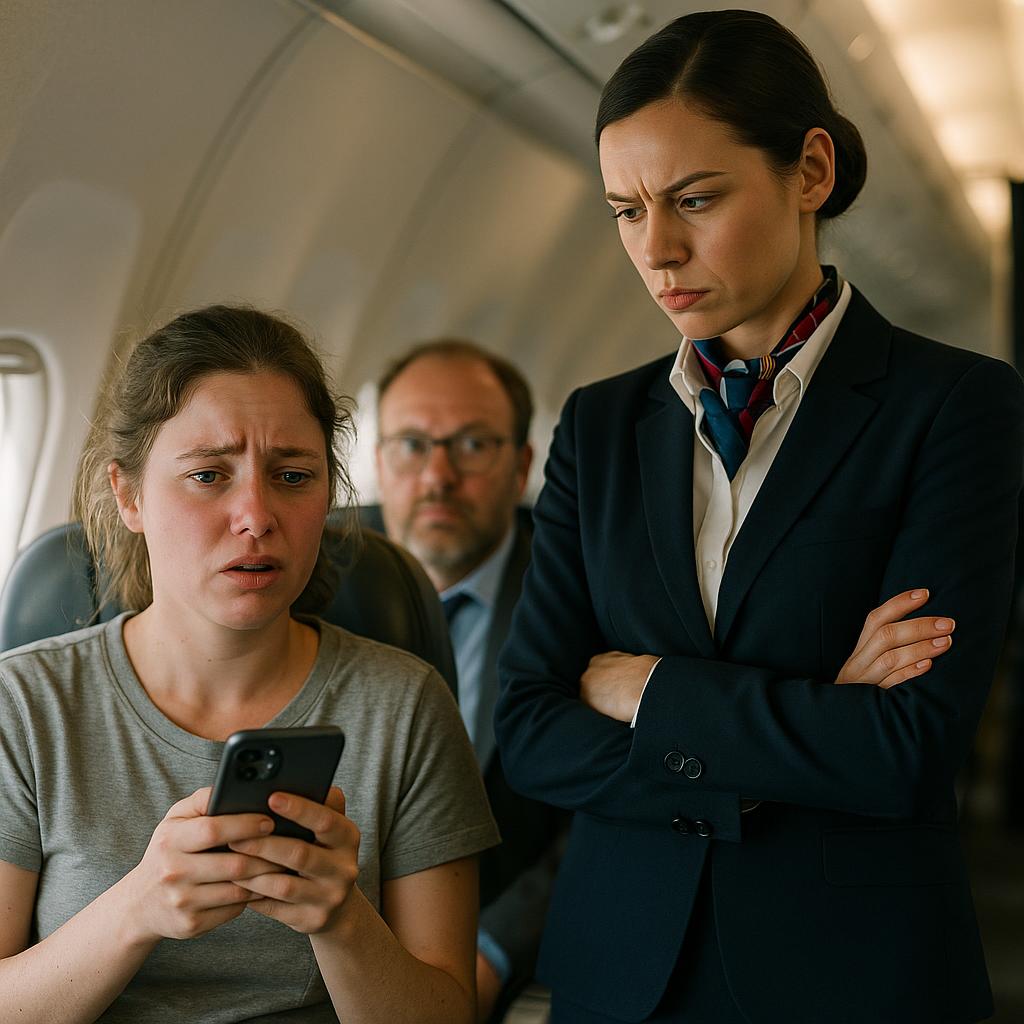 Image by RM AI
Image by RM AI
Public Humiliation
"You're causing a disturbance," the flight attendant announced loudly, her voice carrying down the aisle. "I need you to move to economy immediately." My mouth opened and closed like a fish gasping for water as I tried to explain again about Dad, but she was already reaching for my carry-on. "But my boarding pass—" I started, only to be cut off with a stern, "Now, miss." And just like that, my perfect surprise became a walk of shame. She escorted me down the aisle, her hand firmly on my elbow like I was being arrested for first-class fraud. Every pair of eyes in the cabin seemed to follow me—business travelers looking up from laptops, couples pausing mid-conversation, all witnessing my humiliation in real-time. My carefully chosen blazer and silk blouse now felt like an embarrassing costume, a failed attempt at playing grown-up. The walk to economy felt endless, each step taking me further from my plan and deeper into mortification. I clutched my bag against my chest like a shield, blinking rapidly to hold back the hot tears threatening to spill. When we finally reached an empty middle seat in row 32, she gestured for me to sit with the finality of a judge delivering a sentence. As I squeezed between two strangers, I heard the familiar crackle of the intercom, followed by my dad's voice: "Ladies and gentlemen, this is your Captain speaking..." The cruel irony wasn't lost on me—my father was literally flying this plane, completely unaware that his daughter was being treated like an impostor just two cabins away.
 Image by RM AI
Image by RM AI
Relegated to Economy
I squeezed into the middle seat in economy, wedged between a man who immediately claimed both armrests and a woman who sighed dramatically when I accidentally brushed her elbow. The contrast was brutal—from plush leather throne to this cramped purgatory in less than five minutes. My carefully chosen blazer now felt suffocating, like I was playing dress-up in clothes that mocked me. I stared at the seat pocket in front of me, blinking back tears while trying to maintain whatever shreds of dignity I had left. Then the intercom crackled to life: "Ladies and gentlemen, this is your Captain speaking. I'm Captain Reynolds, and I'll be flying you to Chicago today." My father's confident voice filled the cabin—so close yet impossibly far away. The irony was almost too much to bear: Dad was literally controlling this entire aircraft from the cockpit, completely unaware that his daughter had just been marched through the plane like a criminal. I sank lower in my seat, wondering how my perfect surprise had transformed into this nightmare. The flight attendant who'd escorted me back here caught my eye as she passed, her expression a mix of satisfaction and indifference that made my stomach twist. But something inside me was shifting from embarrassment to anger. This wasn't just about a ruined surprise anymore—it was about being judged and dismissed based on nothing but my age and appearance.
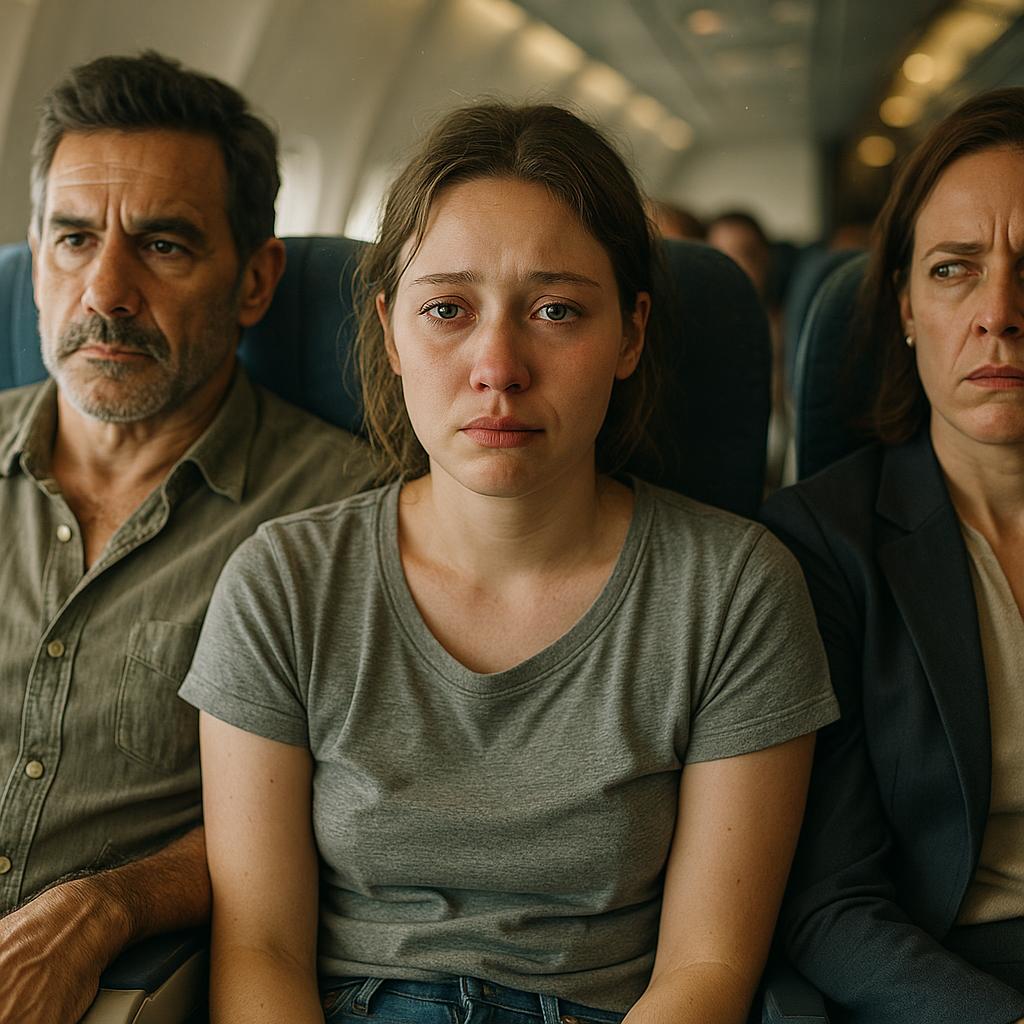 Image by RM AI
Image by RM AI
Dad's Voice From Above
"Ladies and gentlemen, this is your Captain speaking. We're expecting a smooth flight to Chicago today with clear skies all the way." Dad's voice filled the cabin, confident and warm—the same voice that had narrated bedtime stories throughout my childhood. Now it was narrating my humiliation. I sank deeper into my economy seat, the irony crushing me like the knees of the passenger reclining in front. My father was literally controlling this massive aircraft from the cockpit, completely unaware that his daughter had just been paraded through the plane like a trespasser. I glanced at the call button above me, wondering if I should press it and ask another flight attendant to get a message to him. But what would I say? "Please tell Captain Reynolds his daughter is in row 32 because she was kicked out of first class"? The thought of creating another scene made my stomach twist into knots. The woman beside me offered a sympathetic smile, having witnessed my walk of shame. "You okay, honey?" she whispered. I nodded automatically, though I was anything but okay. As Dad continued his announcement about our cruising altitude, I made a decision: I wouldn't let this flight attendant's assumptions ruin Dad's birthday surprise completely. Somehow, I needed to reclaim my seat and my dignity—but I had no idea the cavalry was already on its way.
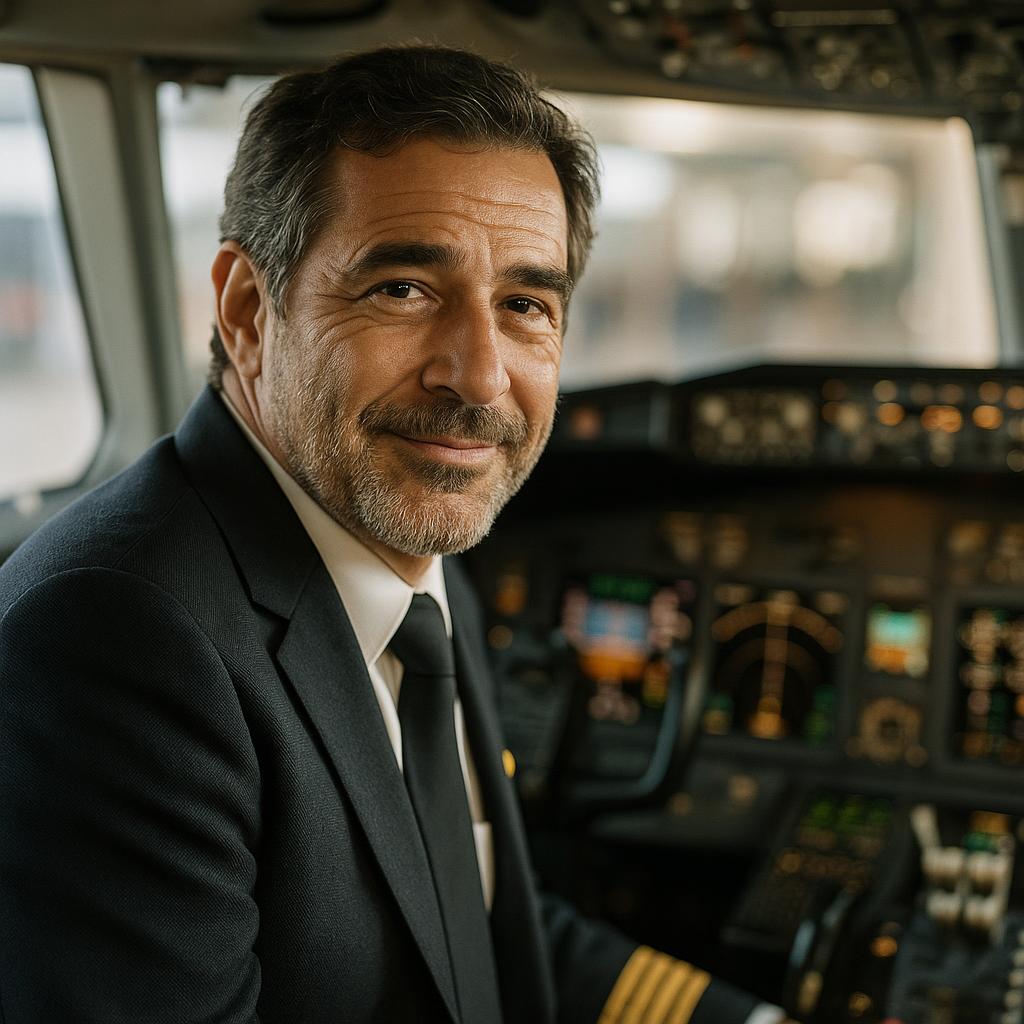 Image by RM AI
Image by RM AI
The Kindness of Strangers
The woman next to me—mid-fifties with kind eyes behind tortoiseshell glasses—leaned closer. "Honey, are you alright?" she whispered, noticing the tears I was desperately trying to blink away. I hesitated, then gave her the thirty-second version of my disaster: the surprise, the miles, the humiliation. Her expression transformed from concern to outrage. "That is completely unacceptable," she said, her voice low but fierce. "My daughter's your age, and I'd be livid if someone treated her that way." She squeezed my hand—a small gesture that somehow made the lump in my throat even bigger. "Your father is flying this plane? Right now?" When I nodded, she immediately reached for the call button. "Let's get him a message." I started to protest—the thought of causing more drama made my stomach clench—but she cut me off gently. "Sometimes we need to stand up for ourselves, even when it's uncomfortable." As she pressed the button, I realized this stranger was fighting for me harder than I was fighting for myself. What happened next would prove that sometimes, the universe sends exactly the allies you need when you're at your lowest point.
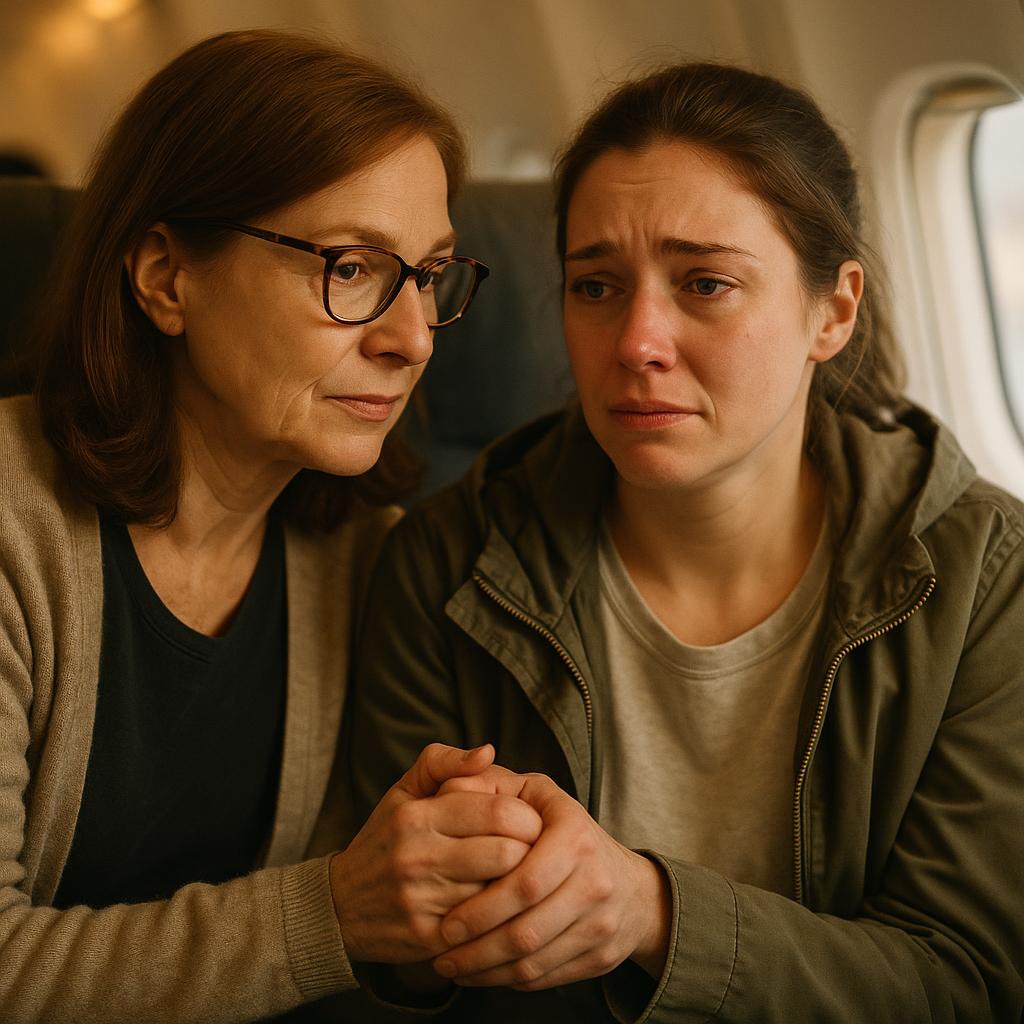 Image by RM AI
Image by RM AI
Message to the Cockpit
The woman beside me flagged down a different flight attendant—this one with a gentle smile and silver-streaked hair. 'Excuse me,' she said firmly, 'but there's been a misunderstanding that needs immediate attention.' As my seatmate explained the situation, the attendant's eyes widened. 'Your father is Captain Reynolds?' she asked me directly, her tone shifting from professional to concerned. I nodded, swallowing hard. 'I'm so sorry this happened. Let me get a message to the cockpit right away.' As she hurried toward the front, I felt a strange mix of relief and mounting anxiety. What if Dad came storming out mid-flight? What if this made everything worse? What if the entire plane found out about my humiliation? The aircraft lifted off the runway, pressing me back into my seat as we climbed into the sky. My stomach lurched—partly from takeoff, partly from nerves. I checked my watch: Dad's birthday surprise was officially in shambles, and now I'd dragged him into my embarrassment. The seatbelt sign dinged off, and passengers began adjusting in their seats. I sat perfectly still, heart pounding, waiting for whatever came next. Little did I know, Captain Dad was about to execute a rescue mission at 30,000 feet.
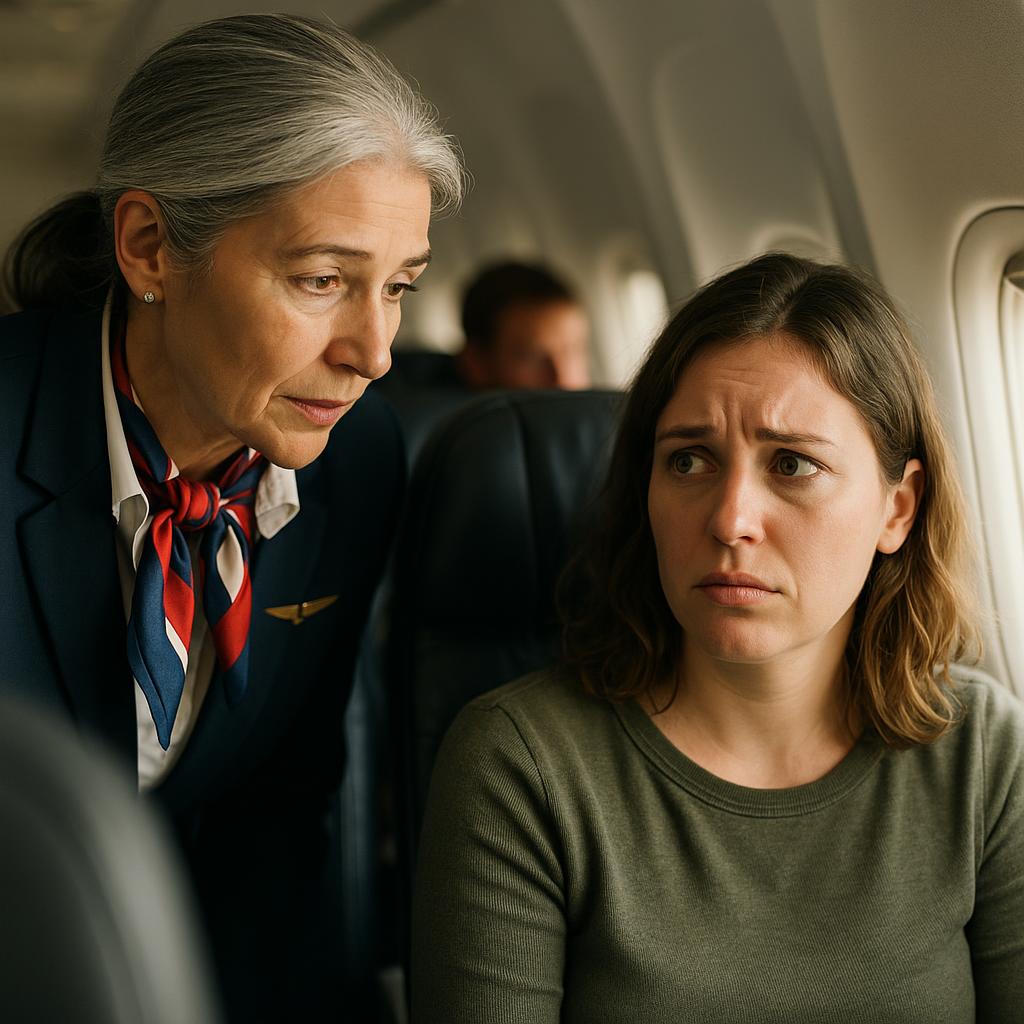 Image by RM AI
Image by RM AI
Dad's Discovery
Twenty minutes into the flight, I was still stewing in my economy seat, trying to decide if I should laugh or cry at the absurdity of my situation. Then I noticed a strange ripple of movement at the front of the cabin. Passengers were turning their heads, whispering to each other. And there he was—Dad, in his full captain's uniform, standing in the aisle like some airline superhero. His eyes scanned the rows until they locked with mine, and I watched his expression transform in real-time: shock, then understanding, then a determination that made my heart swell. He was supposed to be flying the plane, not walking through it! Yet there he stood, all six feet of fatherly authority, moving purposefully toward me while passengers gawked. The businessman across the aisle nudged his seatmate and whispered something. A child pointed excitedly. Even the flight attendants looked confused as Captain Dad made his way down the aisle, his face set in what Mom and I called his 'this-nonsense-stops-now' expression. When he reached my row, he didn't say a word—he just extended his hand to me, palm up, in a gesture that clearly meant 'Let's go.' And in that moment, I realized that sometimes your knight in shining armor comes wearing pilot's stripes and carrying a boarding pass that proves you belonged in first class all along.
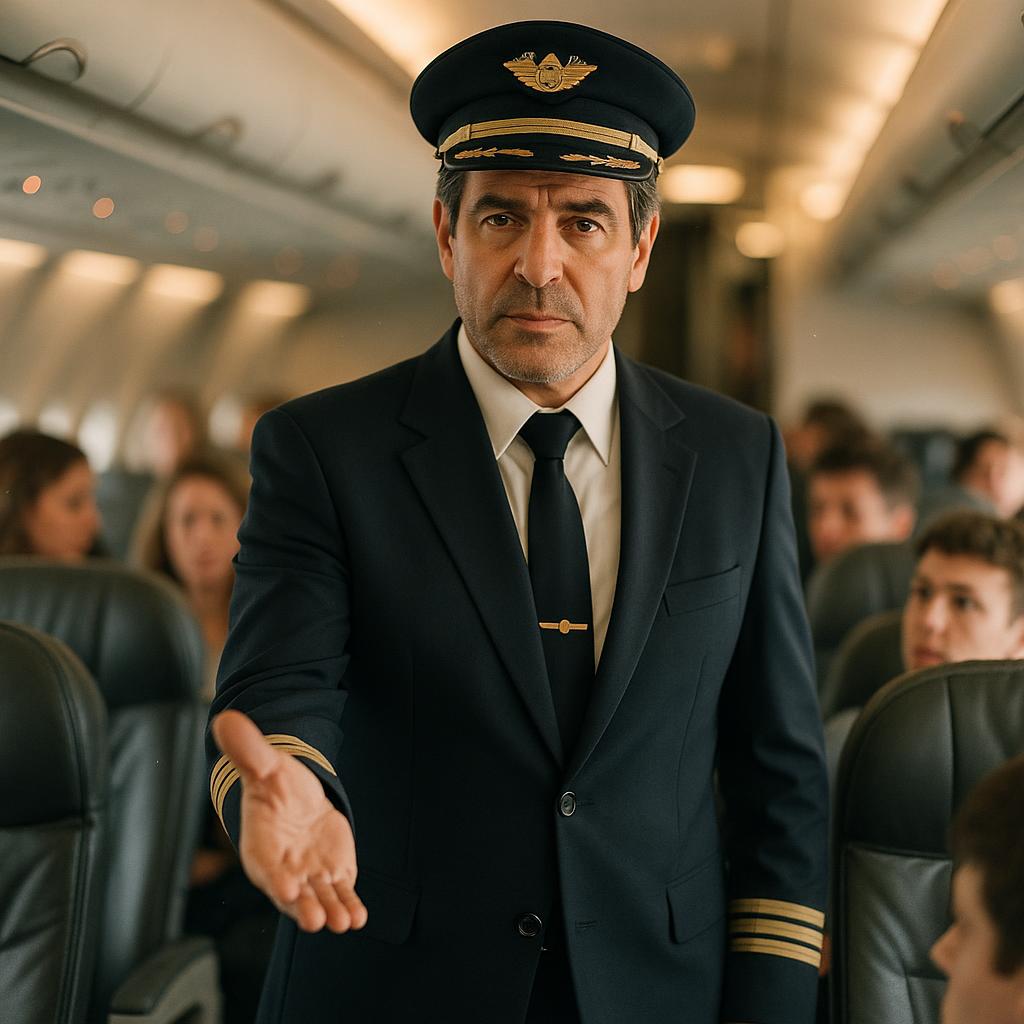 Image by RM AI
Image by RM AI
Father's Intervention
Dad knelt beside my economy seat, his captain's uniform creating a small spectacle as passengers pretended not to stare. 'What happened?' he asked quietly, his voice steady but his eyes concerned. I whispered the whole humiliating story—how I'd used his miles for the first-class seat, how the flight attendant had questioned me, how she'd marched me back here like I was trying to pull some scam. With each detail, Dad's expression hardened from confusion to something I rarely saw: pure protective anger. His jaw tightened as I fought back tears, determined not to create an even bigger scene. 'She wouldn't even let me explain,' I finished, my voice barely audible. Dad nodded once, decisively. Without a word, he stood and extended his hand to me—a simple gesture that somehow carried the weight of his authority. The cabin around us fell silent, passengers watching with undisguised curiosity as the literal captain of the plane helped his daughter to her feet. I could feel the flight attendant's eyes on us from the front of the cabin, probably wondering who had ratted her out to the cockpit. As Dad guided me toward the aisle, his hand steady on my elbow, I realized this wasn't just about reclaiming my seat anymore—it was about something much bigger that neither of us had planned for.
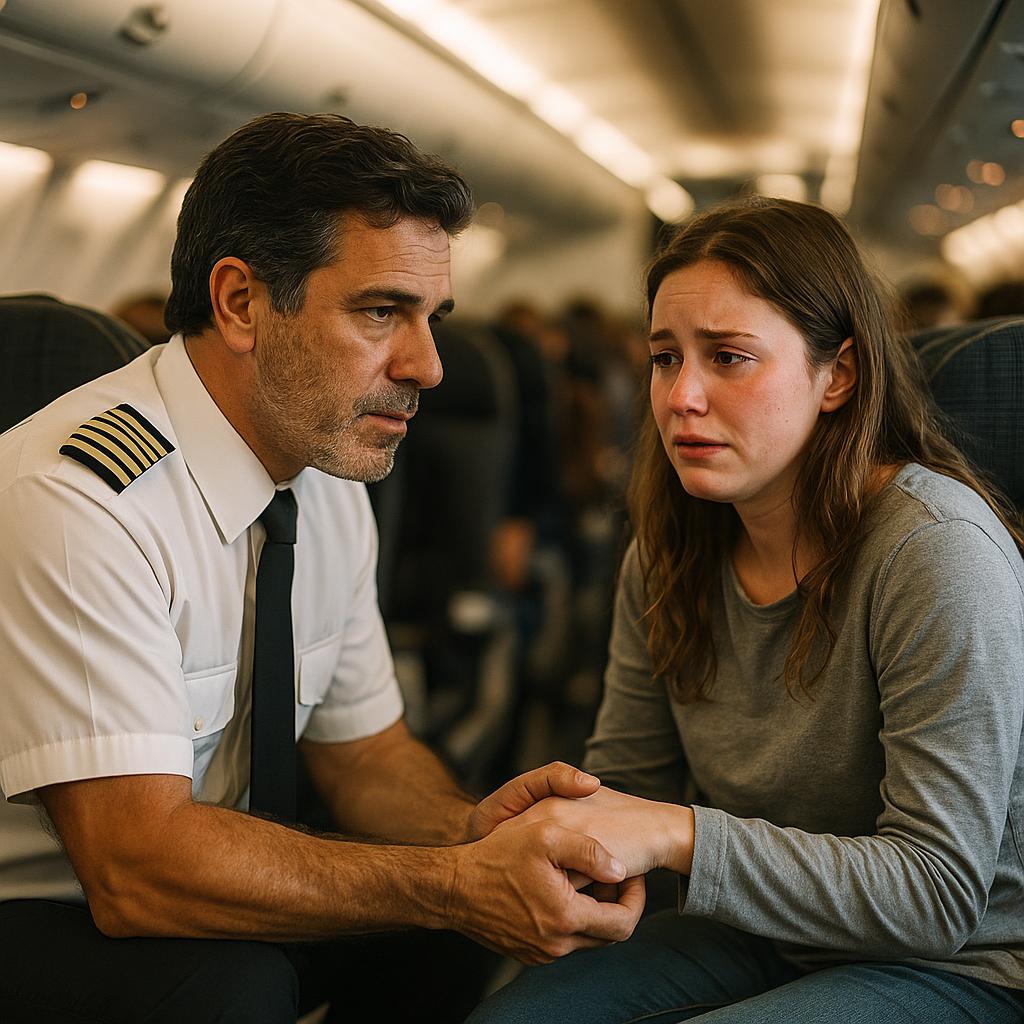 Image by RM AI
Image by RM AI
The Walk of Vindication
Walking back up the aisle with Dad felt like the most surreal parade of my life. Every step we took toward first class seemed to flip the script on my earlier humiliation. Dad held my boarding pass in one hand, his other hand gently guiding me forward with the quiet confidence that comes from commanding aircraft for twenty years. The flight attendant who'd escorted me away stood frozen at the front of the cabin, her face draining of color as she realized exactly who was approaching. "Captain Reynolds," she stammered, her earlier authority evaporating like morning fog. "I believe there's been a misunderstanding about my daughter's seat assignment," Dad said, his voice calm but carrying that unmistakable edge that meant someone had messed up badly. Passengers watched the scene unfold with undisguised interest—some smirking, others nodding in approval. The businessman who'd witnessed my earlier shame actually gave me a thumbs-up as we passed. I felt a strange cocktail of emotions: vindication mixed with lingering embarrassment, relief tinged with awkwardness. As we approached my original seat—2A, still empty and waiting—I realized this moment wasn't just about reclaiming a leather chair. It was about something much more important that would change how I saw myself long after this flight landed.
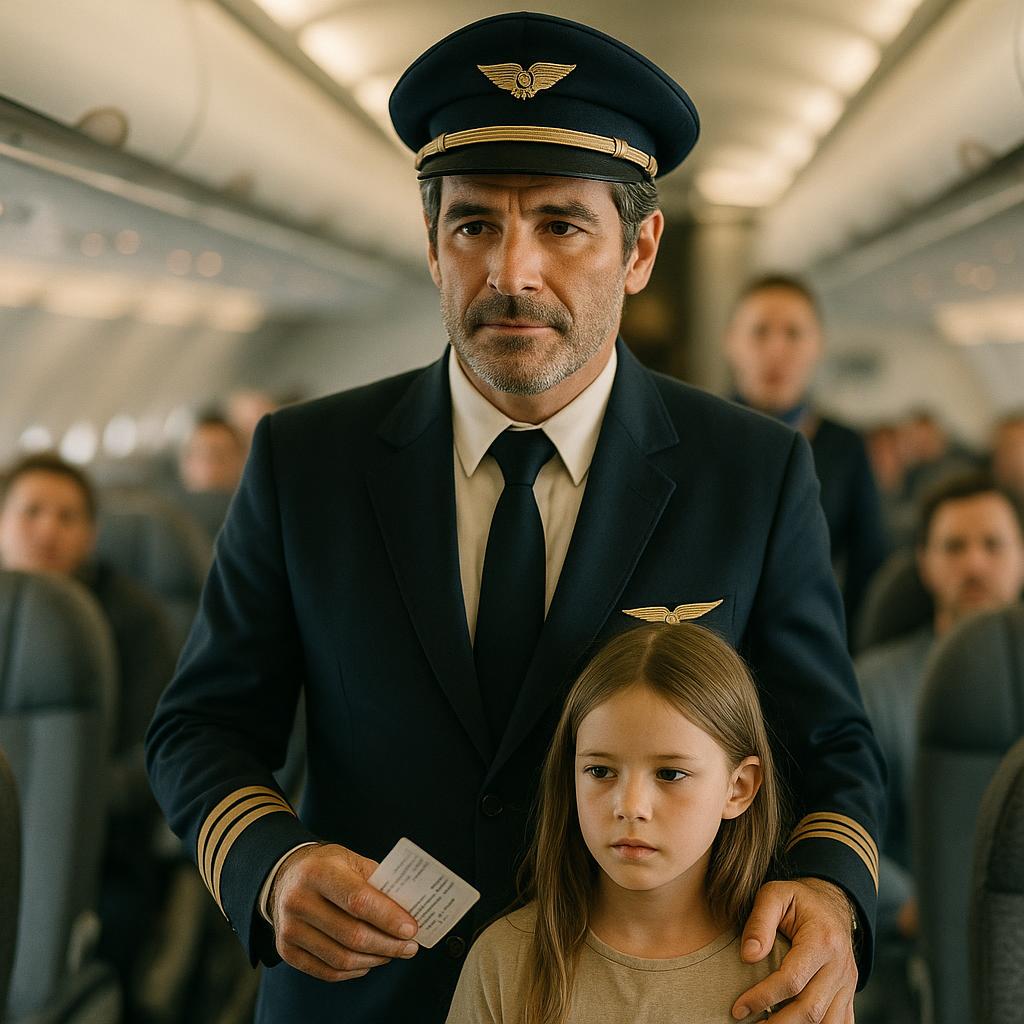 Image by RM AI
Image by RM AI
Reclaiming My Seat
Dad guided me back to seat 2A with the quiet authority that only comes from someone who's spent decades commanding aircraft through stormy skies. The flight attendant who'd humiliated me stood at the front of the cabin, her earlier confidence crumbling as Dad presented my boarding pass. "This seat belongs to my daughter," he said, his voice low but carrying that unmistakable captain's authority. "She had every right to be here." The businessman who'd been seated next to me gave a subtle nod of approval, and the older woman behind us smiled warmly. I sank back into the plush leather seat, my legs still shaky but my spirit soaring. The flight attendant's face flushed red as she stammered, "I—I apologize for the misunderstanding, Captain Reynolds." Dad simply nodded, professional to the core even when defending his daughter. As he turned to head back to the cockpit, he squeezed my shoulder gently. That simple touch said everything: I belonged here. I always had. A crew member approached moments later, leaning down to whisper, "Your seat was always valid, Miss Reynolds." The contrast between this kindness and my earlier humiliation left me emotional but proud. What I didn't realize then was that this wasn't just about a seat—it was about to become something much bigger than either Dad or I had anticipated.
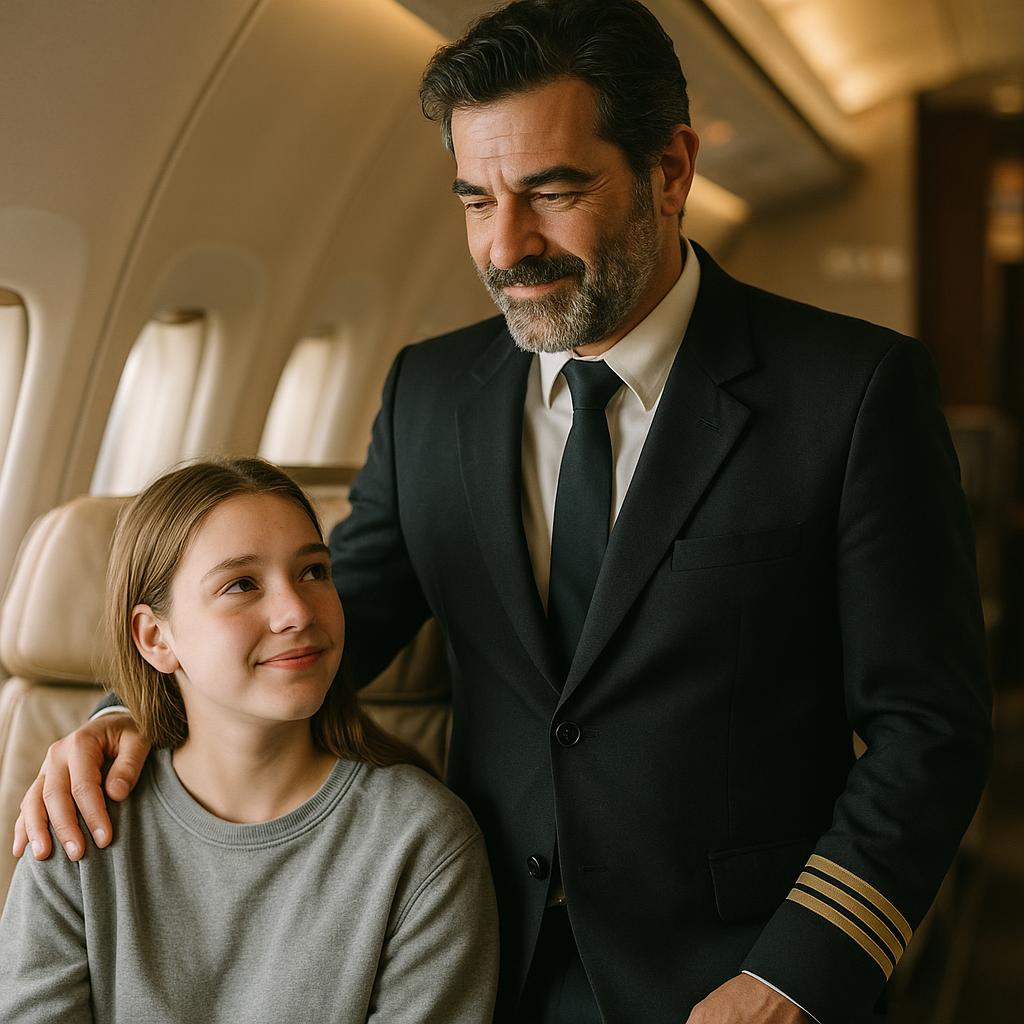 Image by RM AI
Image by RM AI
The Quiet Apology
A different flight attendant approached me, her expression genuinely apologetic. She leaned down close, speaking just above a whisper. "Your seat was always valid, Miss Reynolds. I'm so sorry about what happened." Her kindness after such humiliation left me feeling emotionally whiplashed—like when you're scrolling through cute puppy videos and suddenly hit a political argument in the comments. I nodded, unable to find words as relief and lingering embarrassment battled inside me. Dad gave my shoulder a reassuring squeeze before heading back to the cockpit, his touch saying everything words couldn't. The first-class cabin felt different now—both more welcoming and more complicated. The businessman next to me offered a sympathetic smile, sliding the shared armrest toward me in a silent gesture of support. I settled back into the plush leather, still processing what had just happened. My perfect surprise had imploded, then reassembled itself into something unexpected. I pulled out my phone, tempted to text Mom about the drama but hesitated. The cabin felt charged with curious glances and whispers. What I didn't realize then was that this incident was about to go way beyond just me and this flight—because someone in row 5 had been quietly recording the whole thing.
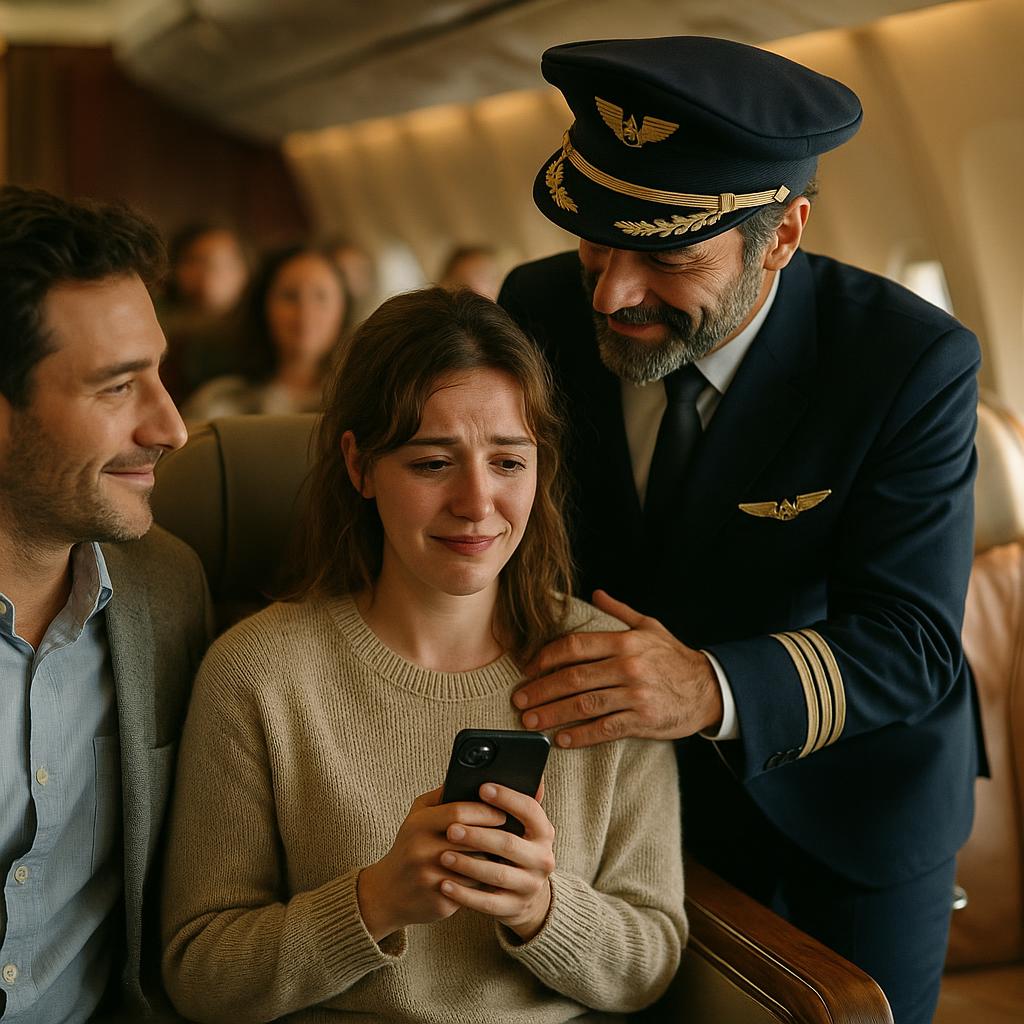 Image by RM AI
Image by RM AI
Unexpected Ally
As I settled back into my rightful first-class seat, still processing the emotional rollercoaster of the past hour, a man in a crisp navy suit approached from the economy section. He had kind eyes behind wire-rimmed glasses and carried himself with quiet confidence. "Excuse me," he said, extending a business card. "I was sitting across from you in economy. I'm an attorney, and I'd like to offer my witness statement about what happened." I took the card—Michael Brennan, Civil Rights Attorney—my fingers trembling slightly. "That kind of treatment is discriminatory and unacceptable," he continued, his voice low but firm. "No one should be profiled based on their age or appearance." His words hit me like a revelation. This wasn't just about my ruined surprise or personal humiliation—it was about something systemic. "Thank you," I managed, suddenly aware that strangers had been watching out for me this entire time. As he returned to his seat, I noticed several passengers nodding in approval. The flight attendant who'd humiliated me was nowhere to be seen, but I could feel the ripple effect of what had happened spreading through the cabin like invisible waves. What had started as my birthday surprise for Dad was transforming into something I never could have anticipated—a moment that might actually matter beyond just this flight.
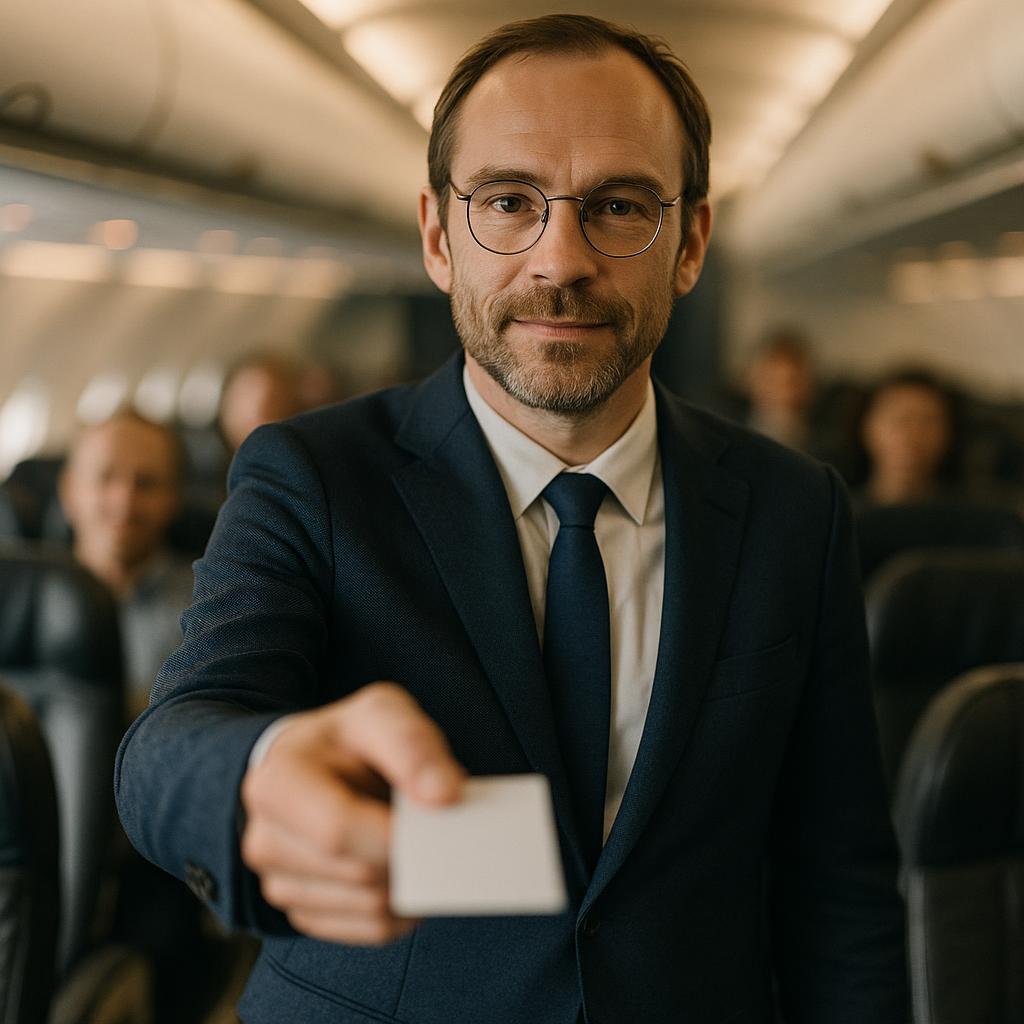 Image by RM AI
Image by RM AI
The Cabin Supervisor's Visit
About twenty minutes after I'd reclaimed my seat, a woman in a senior crew uniform approached. Her name tag read 'Cabin Supervisor Martinez,' and her expression was a mix of professional concern and genuine distress. She knelt beside my seat, speaking in a hushed tone. 'Miss Reynolds, I wanted to personally apologize for what happened earlier. It was completely unacceptable.' Her eyes darted briefly around the cabin before she leaned closer. 'This isn't the first complaint we've received about this particular crew member,' she confided, her voice barely above a whisper. My eyebrows shot up—so this wasn't just about me? 'We take these matters very seriously,' she continued, handing me her business card. 'The airline will be in touch.' As she stood to leave, she squeezed my shoulder gently. 'Your father is one of our most respected pilots. You absolutely belong here.' I watched her walk away, turning her card over in my fingers, processing this new information. What I'd thought was just my personal humiliation was apparently part of a pattern—which somehow made it both better and worse at the same time. I couldn't help but wonder how many other passengers had been treated this way without a pilot dad to rescue them.
 Image by RM AI
Image by RM AI
Landing with Mixed Emotions
As the plane began its descent, I felt like I was on an emotional rollercoaster that wouldn't stop. The seatbelt sign dinged, but I was already strapped in—physically and mentally. Dad's voice came over the intercom again, professional as ever, though I detected a hint of extra warmth when he mentioned we'd be landing "ahead of schedule." I caught the subtle wink in his words; he'd always been my hero, but today he'd literally swooped in to save me. The businessman beside me closed his laptop and turned. "That took guts, what your dad did," he said quietly. "Not many people stand up like that." As we touched down with a gentle bump, passengers began gathering their belongings, but several paused at my row. "Good for you," whispered a grandmother type. A college-aged guy gave me a thumbs up. "That video's gonna blow up," he said cryptically, making me wonder what exactly he meant by 'video.' I hadn't noticed anyone recording, but these days, everything ends up online. As people filed toward the exit, I sat frozen, unsure how to feel. My perfect birthday surprise had morphed into something completely unexpected—a public stand against prejudice that apparently resonated with strangers. What was supposed to be Dad's special day had somehow become mine, and I wasn't sure if I was ready for whatever came next.
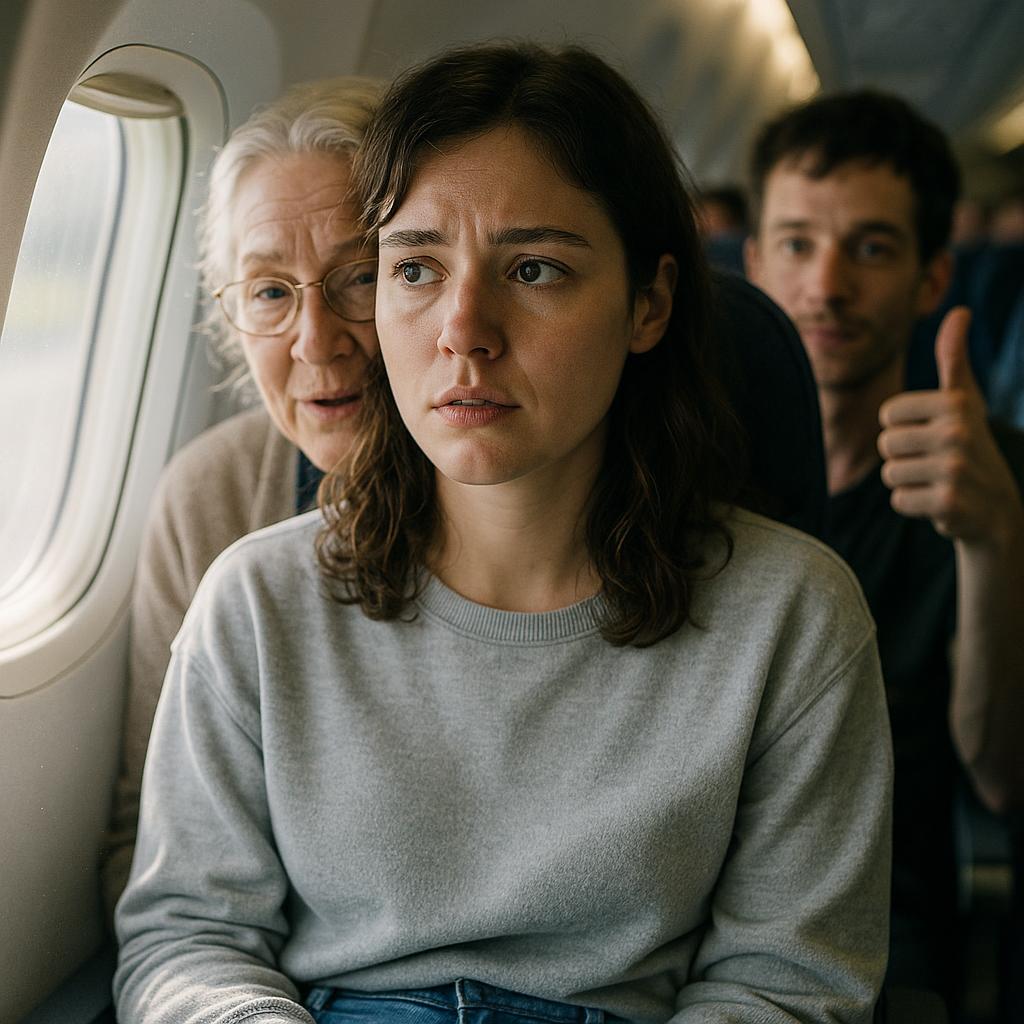 Image by RM AI
Image by RM AI
Reunion at the Gate
I waited nervously at the gate, my emotions still a jumbled mess after everything that had happened. When Dad finally emerged from the crew area, still in his captain's uniform with those four gold stripes on his shoulders, his face broke into a smile that made my heart swell. "Not exactly how I pictured seeing you today," he said, pulling me into a bear hug that smelled like airplane coffee and his familiar aftershave. I melted into his embrace, suddenly feeling like a little kid again instead of a 19-year-old college student who'd just been through the most mortifying experience of her life. "Happy birthday, Dad," I mumbled into his shoulder. "Sorry your surprise got so... complicated." He pulled back, holding me at arm's length, his expression a perfect mix of fatherly pride and protective anger. "Emily," he said firmly, "you have nothing to apologize for. I'm proud of you for standing your ground." His words hit me like a wave of validation—not just because he was my dad, but because he understood exactly what this was about. It wasn't just about a seat; it was about being seen and respected. As we walked toward baggage claim, his arm around my shoulders, I had no idea that my phone was already blowing up with notifications about a video that was rapidly gaining traction online.
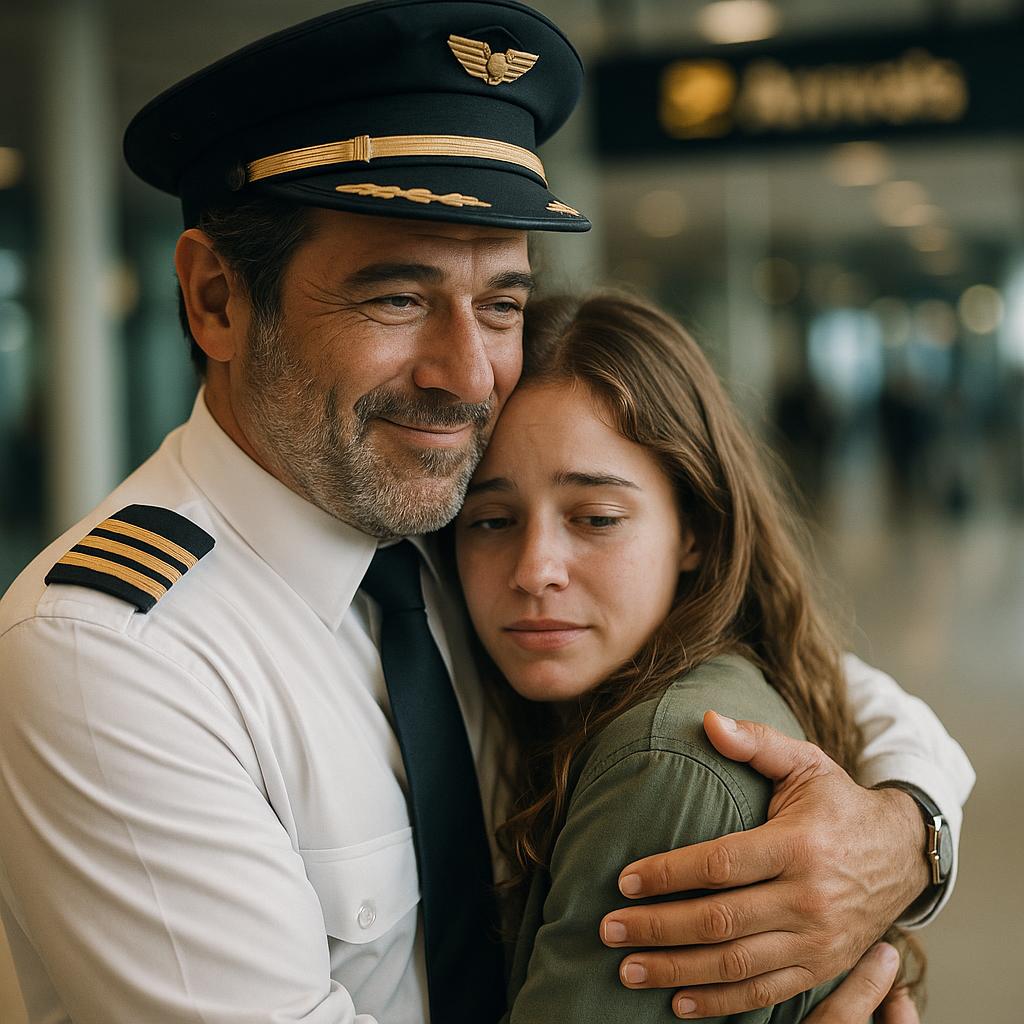 Image by RM AI
Image by RM AI
The Viral Moment
Dad and I were halfway through our celebratory birthday dinner when my phone started buzzing like a hive of angry bees. 'You might want to check that,' Dad said, nodding toward my purse. I pulled out my phone to find a flood of notifications—texts from friends, Instagram tags, and Twitter mentions. 'Um, Dad? I think we're internet famous.' Someone in row 5 had recorded the whole incident—from my humiliating escort to economy to Dad's captain-mode rescue mission—and posted it online. The video already had thousands of views and comments were pouring in: 'That flight attendant was totally profiling her!' 'Captain Dad for the win!' 'This is why assumptions are dangerous.' I stared at the screen, fork frozen midway to my mouth, watching strangers debate my experience. 'I don't know how to feel about this,' I admitted, showing Dad the video. 'I mean, it's validating that people agree it was wrong, but also... everyone's seeing my most embarrassing moment.' Dad set down his knife and fork, his expression thoughtful. 'Sometimes our most uncomfortable moments become our most important ones, Em. The question is—what do you want to do with this platform you've suddenly been given?'
 Image by RM AI
Image by RM AI
The Airline's Response
The next morning, my phone rang with an unfamiliar number. 'Miss Reynolds? This is Marissa Chen from Customer Relations at Skyway Airlines.' Dad and I exchanged glances across the breakfast table as I put the call on speaker. The representative's voice was professionally apologetic as she explained they'd received 'multiple witness statements' about yesterday's incident. 'We're conducting a formal review,' she assured us, offering compensation in the form of flight vouchers and bonus miles. Dad listened silently, his coffee cooling untouched, his expression unreadable to anyone but me. I recognized that look—it was the same one he wore when negotiating with mechanics about aircraft safety issues. 'We appreciate the gesture,' he finally said, 'but this isn't about free flights.' His voice remained calm, but I could hear the steel underneath. 'My daughter was publicly humiliated based on assumptions about who belongs in first class. What's being done to prevent this from happening to other passengers?' The representative paused, clearly not expecting pushback on their standard make-it-go-away offer. 'I understand your concern, Captain Reynolds. I'll escalate this to our diversity training team.' As the call ended, Dad looked at me with determination in his eyes. 'This isn't over, Em. Sometimes the hardest part isn't standing up for yourself—it's making sure the system changes so others don't have to.'
 Image by RM AI
Image by RM AI
News of Suspension
A week after the incident, Dad called me at college. 'Em, I just heard from HR. The flight attendant has been suspended pending investigation.' My stomach dropped. On one hand, I felt vindicated—the airline was taking this seriously. On the other hand, I felt this wave of guilt crash over me. Someone's livelihood was hanging in the balance because of what happened to me. That night, I couldn't sleep, tossing and turning with mixed emotions. When I visited home that weekend, Dad found me staring blankly at my tea, lost in thought. He sat across from me, his hands wrapped around his own mug. 'You look troubled,' he said gently. I confessed my conflicted feelings—relief mixed with guilt. Dad listened, nodding thoughtfully. 'Accountability isn't revenge, Em,' he finally said. 'Your worth doesn't come from whether someone believes you belong—it comes from whether you know you do.' He explained that sometimes silence allows injustice to continue. 'If we don't speak up, nothing changes.' His words settled over me like a warm blanket, but I couldn't help wondering: was there a difference between justice and punishment, and which one was I really seeking?
 Image by RM AI
Image by RM AI
Dad's Wisdom
Dad set a steaming mug of chamomile tea in front of me, the familiar ritual somehow grounding after the chaos of the past week. I wrapped my hands around it, drawing comfort from its warmth as I confessed my conflicted feelings. 'I'm glad they're taking it seriously, but I feel terrible that someone might lose their job because of me.' Dad settled into the chair across from me, his captain's confidence momentarily replaced by thoughtful patience. 'Accountability isn't revenge, Em,' he said, stirring honey into his own tea. 'Your worth doesn't come from whether someone believes you belong—it comes from whether you know you do.' I let his words sink in as steam curled between us. 'But what if she just made a mistake?' I pressed. Dad's eyes met mine. 'Sometimes silence allows injustice to continue. If we don't speak up, nothing changes.' He reached across the table, his weathered hand covering mine. 'This isn't just about your surprise gone wrong—it's about how people treat others when they don't fit a stereotype.' I nodded slowly, realizing this moment was teaching me something far more valuable than any first-class ticket ever could. What I couldn't have known then was how profoundly this lesson would shape my next decision.
 Image by RM AI
Image by RM AI
Return to Campus
Walking back into my dorm after the whole airline fiasco felt surreal. I'd barely made it through the door when Zoe, my roommate, practically tackled me with a hug. 'Oh my god, Em! You're like, internet famous!' she exclaimed, pulling me to her laptop where my mortified face was frozen on screen. Apparently, the video had made rounds through campus social media. For the next few days, I couldn't grab coffee at the student union without someone approaching with sympathetic eyes: 'Hey, aren't you the girl from that flight?' or 'Your dad is such a badass!' It was validating but also exhausting to have my humiliation playing on repeat. Zoe, ever my fierce advocate, wouldn't let it drop. 'You should write about it for The Daily Beacon,' she insisted one night, referring to our campus newspaper. 'Turn this mess into something meaningful.' I stared at my ceiling, considering her words. The thought of deliberately putting myself back in that moment made my stomach twist, but there was something appealing about reclaiming the narrative—about transforming my embarrassment into something that might actually help others. What I didn't realize was that agreeing to write that article would connect me with someone who'd experienced something eerily similar on the exact same airline.
 Image by RM AI
Image by RM AI
Finding My Voice
I sat at my desk, fingers hovering over my laptop keyboard, the cursor blinking expectantly. After days of replaying the incident in my mind, I finally decided to follow Zoe's advice and write about it for The Daily Beacon. To my surprise, once I started typing, the words poured out like I'd uncorked something inside me. I wrote about the flight attendant's dismissive glance, the humiliation of being marched to economy, and the assumptions people make based on age and appearance. 'Sometimes discrimination doesn't announce itself with a megaphone,' I typed. 'Sometimes it's just a quiet suggestion that you don't belong.' I described Dad's intervention not as a rescue mission but as a moment of accountability. With each paragraph, I felt lighter, like I was transforming my embarrassment into something meaningful. When I finally hit save, three hours and 1,500 words later, I realized this wasn't just about me anymore. It was about all the people who've been made to feel they don't belong somewhere because they don't fit someone else's mental image. What I didn't expect was the email I'd receive the next morning from the editor-in-chief, asking if I'd be willing to turn my personal essay into a three-part investigative series.
 Image by RM AI
Image by RM AI
The Article Goes Live
Three days after submitting my article to The Daily Beacon, I woke up to my phone practically vibrating off my nightstand. 'First Class Lessons in Second-Class Treatment' had not only made the front page of our campus paper but had been picked up by HuffPost. My inbox was flooded with interview requests from local news stations, podcasts, and even a producer from Good Morning America. 'You've struck a nerve,' the campus editor wrote. 'People are sharing this everywhere.' I sat on my bed, still in my pajamas, watching the view counter climb on the digital version. The comments section was a battlefield of support and criticism—some calling me brave, others accusing me of entitlement. Dad called around noon, his voice a mixture of pride and concern. 'How are you handling all this attention, Em?' I stared out my dorm window, watching students cross the quad, oblivious to my sudden minor celebrity status. 'I'm not sure I want to be the poster child for airline discrimination,' I admitted. 'You don't have to be,' he said gently. 'But sometimes the stories that make us most uncomfortable are the ones that need telling.' As I hung up, my phone pinged with a new email—from someone claiming to be a former flight attendant for Skyway Airlines with 'information that might interest you.'
 Image by RM AI
Image by RM AI
Unexpected Allies
The morning after my article went live, I opened my inbox to find an email with the subject line: 'We stand with you.' My finger hovered over it nervously before clicking. 'Dear Emily,' it began, 'We are a group of current Skyway Airlines flight attendants who want to thank you for speaking up.' I read on, my heart pounding. They explained that the flight attendant who'd humiliated me had a history of similar behavior—profiling younger passengers, international travelers, and people of color who were seated in premium cabins. 'Many of us have reported her conduct through proper channels, but nothing changes,' they wrote. 'Your story finally brought attention to what we've been trying to address for years.' The email was signed by seven different crew members, each adding a personal note of support. One wrote, 'I was on a flight where she did something similar to a young doctor traveling to a medical conference.' Another added, 'Your father is respected by everyone who flies with him. He did what many of us wish we could do.' I sat back in my chair, a strange sense of validation washing over me. This wasn't just about my bad experience—I'd accidentally stumbled into a much bigger issue that affected countless passengers and even the flight attendant's own colleagues. What I couldn't have anticipated was how these unexpected allies would transform my understanding of what happened next.
 Image by RM AI
Image by RM AI
The Airline's Policy Review
Two weeks after the article went viral, my phone lit up with an email from Skyway Airlines' Chief of Customer Experience. 'Dear Ms. Reynolds,' it began formally, 'In light of recent events, we're conducting a comprehensive review of our training procedures regarding passenger interactions and bias awareness.' I read it twice, hardly believing my eyes. They wanted me—the girl who'd been humiliated in first class—to participate in a focus group about young travelers' experiences. Dad looked over my shoulder as I showed him the email. 'They're actually listening,' I said, my voice barely above a whisper. 'Of course they are,' he replied, squeezing my shoulder. 'Your voice matters, Em.' The invitation felt like validation after weeks of emotional turbulence. This wasn't just about getting an apology anymore; it was about potentially changing how an entire airline treated passengers who didn't fit their mental image of who 'belonged' in premium cabins. As I typed my acceptance, I wondered how many other stories like mine had gone untold, how many people had silently accepted being made to feel less-than. What I couldn't have known then was that the focus group would put me face-to-face with the very flight attendant who had started this whole journey.
 Image by RM AI
Image by RM AI
Media Attention
The email from Good Morning America sat in my inbox for three days before I finally showed it to Dad. 'They want me to talk about what happened... on national television,' I said, my voice barely above a whisper. We were sitting at our kitchen table, the same spot where we'd had so many important conversations since the incident. Dad looked at me thoughtfully, stirring his coffee. 'That's a big platform, Em. What do you want to do with it?' I stared at my hands, anxiety bubbling in my chest. 'I'm terrified,' I admitted. 'What if I freeze up? What if I make things worse?' Dad reached across the table and squeezed my hand. 'Sometimes the stories that need telling most are the ones that make us uncomfortable,' he said gently. 'This isn't just about you anymore.' He was right. This had grown beyond my humiliation into something that could potentially help others. After a sleepless night weighing the pros and cons, I drafted my response. 'I'll do the interview,' I wrote, 'but I'd like to focus on the systemic issues, not just my personal experience.' As I hit send, my phone pinged with a text from an unknown number: 'I saw your article. The same thing happened to me on Skyway last year. Thank you for speaking up when I couldn't.'
On-Air Vulnerability
The morning of the Good Morning America interview, my stomach was in knots. I changed outfits three times before settling on a simple blazer—not to prove I belonged this time, but because it made me feel strong. In the green room, Dad squeezed my hand and whispered, "Just be yourself, Em." The studio lights were blinding as I settled into the interview chair, microphone clipped to my collar. "So Emily," the host began warmly, "walk us through what happened that day." As I recounted the story—the surprise gone wrong, the humiliation, Dad's intervention—my voice grew steadier. When she asked what I hoped would come from sharing my story nationally, I surprised myself with my answer. "I hope people will think twice before making assumptions about who belongs where," I said simply. "Because belonging isn't about how old you are, what you're wearing, or how much money you have. It's about being treated with basic dignity." The host nodded, visibly moved. Later that day, my phone exploded with notifications as clips of that moment spread across social media. What I couldn't have anticipated was who would be watching—and how my words would reach someone with the power to make real change.
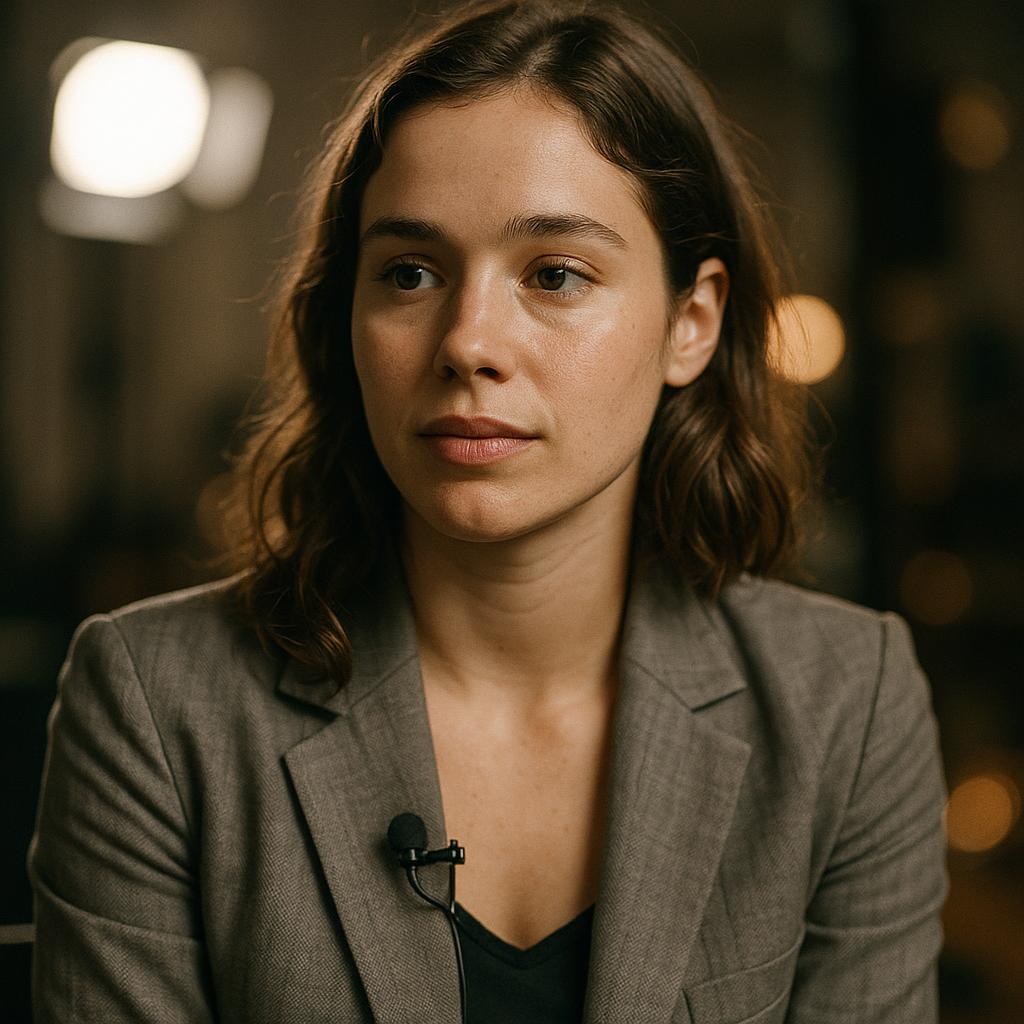 Image by RM AI
Image by RM AI
The Backlash Begins
The morning after my GMA interview, I made the mistake of checking Twitter. My stomach dropped as I scrolled through the replies: 'Entitled millennial playing victim,' 'This is what's wrong with your generation,' 'Flight attendants have REAL problems to deal with.' Someone even created a hashtag: #FirstClassProblems. I closed my laptop, hands shaking. This wasn't the response I'd expected. Later that day, a classmate I barely knew approached me in the campus coffee shop. 'Saw you on TV,' she said, not quite meeting my eyes. 'Don't you think you're making a big deal over nothing?' I mumbled something about having class and practically ran out, coffee forgotten. That night, I called Dad in tears. 'Maybe they're right,' I whispered. 'Maybe I should have just let it go.' Dad was quiet for a moment. 'Em,' he finally said, 'when people push back this hard, it usually means you've touched a nerve that needed touching. The comfortable don't like being made uncomfortable.' His words steadied me, but as I hung up, my phone pinged with a notification—someone had found my personal Instagram and the comments were flooding in. What I didn't realize was that the most surprising message would come from someone I never expected to hear from.
 Image by RM AI
Image by RM AI
Support from Unexpected Places
As the backlash intensified online, my inbox became a sanctuary of unexpected support. 'I was a flight attendant for 32 years,' one email began, 'and I watched this happen countless times but never had the courage to speak up.' Another message came from a 22-year-old medical student: 'They did the same thing to me last month. I thought I was alone until I saw your interview.' Each morning, I'd steel myself against the Twitter trolls by reading these messages first—little digital lifelines from strangers who understood. A retired Skyway pilot wrote that he'd forwarded my story to every colleague in his network. 'This industry has an unspoken caste system,' he explained. 'You're dismantling it simply by telling your truth.' My favorite came from an 80-year-old grandmother who'd been escorted from first class on her 75th birthday: 'I was too embarrassed to tell anyone. Thank you for giving me permission to feel angry five years later.' These connections formed a protective bubble around me, making the #FirstClassProblems hashtag sting a little less. What I didn't expect was the email that arrived three days after the GMA interview—from the flight attendant herself.
 Image by RM AI
Image by RM AI
The Flight Attendant's Side
The email from the flight attendant sat in my inbox for three days before I finally opened it. 'Dear Emily,' it began, 'I wanted to reach out personally about what happened.' She explained that Skyway had been dealing with a surge of unauthorized upgrades and seat-switching, and she'd been following strict protocols. 'When I see someone who doesn't fit the typical first-class demographic, I'm required to verify their boarding pass,' she wrote. My stomach twisted as I read her words. Was this really about protocol and not my age or appearance? She mentioned receiving disciplinary action and mandatory retraining. 'I'm not asking for your forgiveness,' she continued, 'but I wanted you to understand the context.' I forwarded the email to Dad, my thoughts swirling. If she was just doing her job, was I wrong to have made such a public stand? But then again, why was 'doesn't fit the typical first-class demographic' even a category? And who decided what that looked like? The more I thought about it, the more complicated everything felt. That night, I couldn't sleep, torn between empathy for someone whose career was in jeopardy and the certainty that I'd been treated unfairly. What I didn't expect was the response I'd get when I decided to meet her face-to-face.
 Image by RM AI
Image by RM AI
A Meeting Proposal
The email from Skyway's HR department arrived on a Tuesday morning: 'As part of our commitment to resolving this situation, we'd like to facilitate a mediated conversation between you and Ms. Harlow.' My heart practically stopped. Meet the flight attendant who had humiliated me? Face-to-face? I paced my dorm room, phone clutched in my sweaty palm, before finally calling Dad. 'They want me to meet her,' I blurted when he answered. There was a pause on the line. 'What do you think about that, Em?' he asked carefully. I sank onto my bed, conflicted. Part of me wanted to delete the email and pretend it never existed. Another part was curious—what would she say? Would she apologize? Defend herself? 'I'm scared,' I admitted. 'But maybe... maybe this is how real change happens? Not just through viral videos and TV interviews, but through actual conversations?' Dad hummed thoughtfully. 'Sometimes the hardest conversations are the most important ones,' he said. 'But this is your journey, not mine.' I stared at the ceiling, imagining sitting across from the woman whose actions had changed the trajectory of my semester. What would I even say to her? And more importantly—was I ready to hear what she had to say to me?
 Image by RM AI
Image by RM AI
The Decision
After three days of internal debate, I finally replied to Skyway's HR department: 'I'll participate in the mediated conversation.' My finger hovered over the send button for a full minute before I committed. That evening, Dad and I sat on our porch swing, the same spot where he'd taught me about constellations and flight paths as a kid. 'I'm proud of you, Em,' he said, wrapping an arm around my shoulders. 'Just remember—you don't owe anyone forgiveness, but understanding is never wasted.' I nodded, watching fireflies blink in the gathering dusk. 'What if she makes me doubt myself again?' I whispered. Dad squeezed my shoulder. 'Then you remember who you are.' As the meeting date approached, my anxiety crescendoed. I rehearsed what I might say, then scrapped the mental script, knowing it would sound forced. I journaled obsessively, trying to untangle my feelings. The night before, I barely slept, imagining a dozen different scenarios—from tearful apologies to defensive justifications. By morning, I felt simultaneously exhausted and wired, like I'd mainlined three espressos on an empty stomach. What I couldn't have anticipated was how this conversation would reshape not just my understanding of what happened that day on the plane, but my entire perspective on conflict and resolution.
 Image by RM AI
Image by RM AI
Face to Face
The Skyway Airlines headquarters felt impossibly sterile as I followed the HR representative down a hallway lined with framed vintage travel posters. My palms were sweating so much I had to wipe them on my jeans before entering the conference room. And there she was—Patricia—sitting ramrod straight in a navy cardigan instead of her uniform. She looked... normal. Human. Smaller somehow. The mediator, a woman with kind eyes and salt-and-pepper hair, explained the ground rules: we'd each share our perspective without interruption, then respond. No accusations, just 'I felt' statements. When Patricia glanced up at me, I expected to see the same contempt from that day on the plane. Instead, I saw something that caught me off guard—uncertainty, maybe even fear. My rehearsed speech suddenly felt inadequate. The mediator slid water bottles toward each of us and asked who wanted to begin. I raised my hand before I could second-guess myself. 'I'd like to start,' I said, my voice steadier than I expected. 'I want to explain what it felt like to be nineteen years old and told I didn't belong somewhere I had every right to be.' Patricia nodded slightly, and as I began to speak, I realized this conversation might be even harder than the humiliation that started it all.
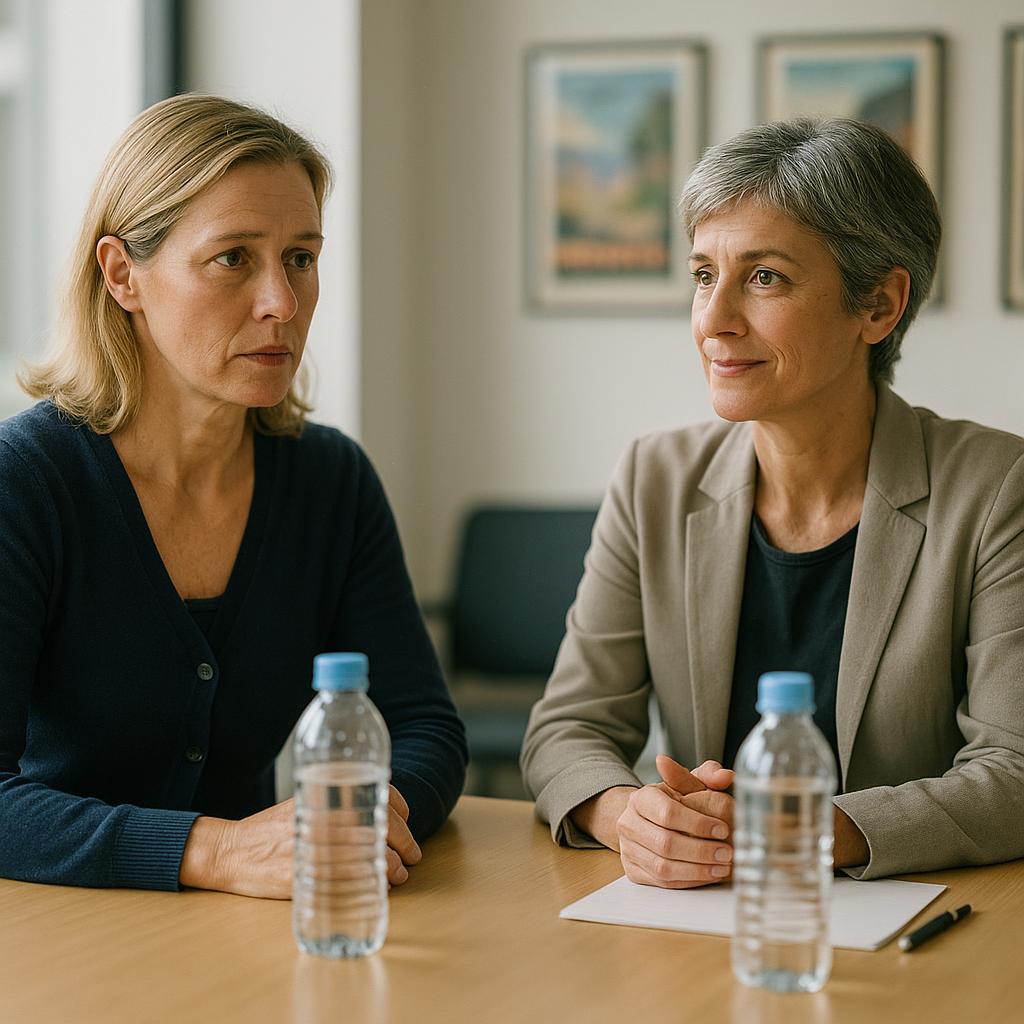 Image by RM AI
Image by RM AI
Patricia's Perspective
Patricia took a deep breath before speaking. 'I need you to understand something, Emily. We've had a 40% increase in passengers trying to sneak into first class this year alone.' Her voice was steady but strained. 'Management has been breathing down our necks about it. Three flight attendants were written up last month for not being vigilant enough.' She fidgeted with her water bottle. 'When I saw someone your age in first class...' she paused, wincing slightly, 'I made an assumption I shouldn't have made.' I watched her face carefully as she spoke, searching for signs of the contempt I'd felt that day. Instead, I saw someone caught between company policy and human decency. 'The airline trains us to spot people who don't fit the typical profile,' she admitted. 'But that doesn't excuse how I treated you.' When I described how it felt to be publicly questioned, to have my legitimacy challenged in front of strangers, something shifted in her expression. 'I never considered how humiliating that would be,' she said quietly. 'I was so focused on doing my job that I forgot you were a person first.' That flicker of genuine regret in her eyes made something inside me soften, just a little. But then she said something that made me realize this conversation was about to get much more complicated.
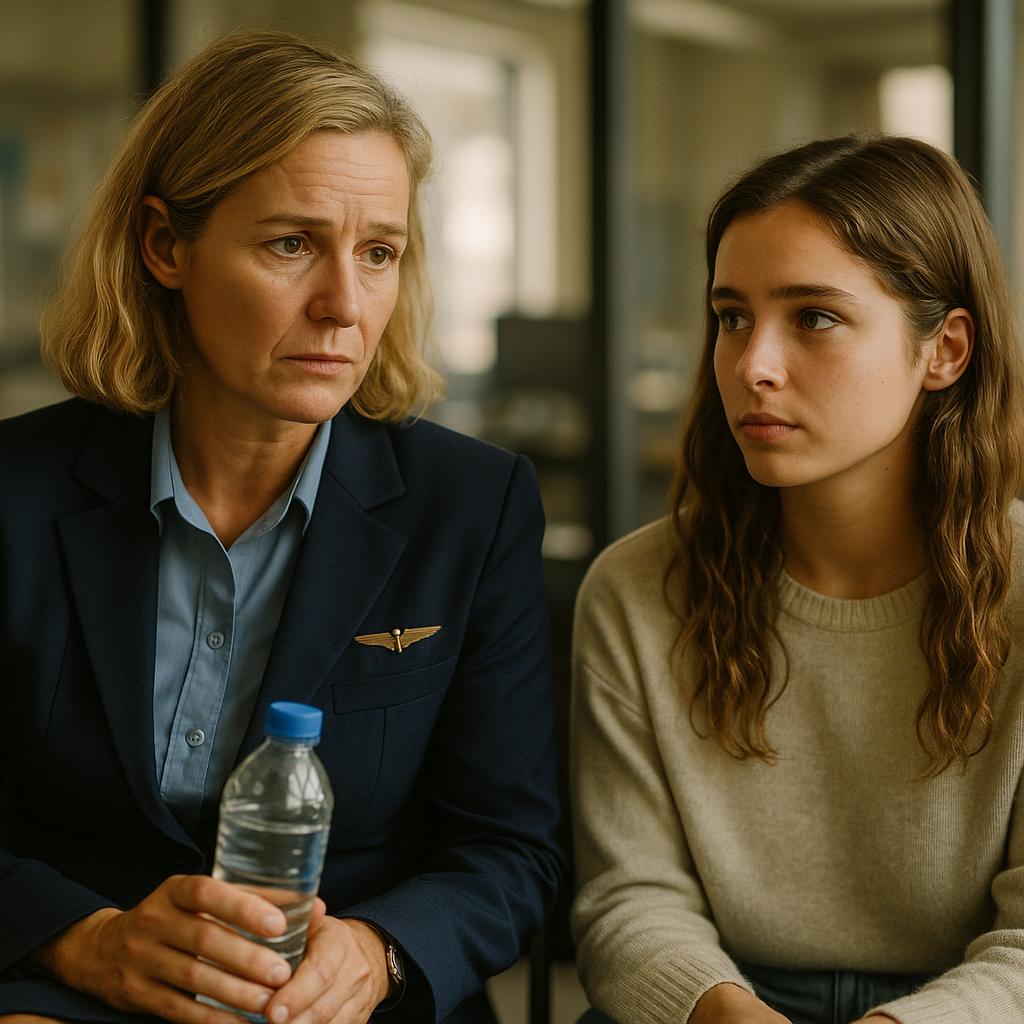 Image by RM AI
Image by RM AI
Finding Common Ground
Patricia's voice softened as she shared something unexpected. 'I know what it's like to be judged based on appearances,' she said, explaining how as one of the few female flight attendants over 50, she constantly battled assumptions about her capabilities. 'Younger crew members get assigned to first class more often. Passengers sometimes request a different attendant when they see me.' I felt a strange twist in my stomach—not forgiveness exactly, but recognition. We were both fighting different sides of the same broken system. 'That doesn't excuse what happened to you,' she added quickly, meeting my eyes. 'But sometimes we enforce the very biases we suffer from.' The mediator nodded encouragingly as we navigated this unexpected common ground. When Patricia described a passenger who once loudly asked if she was 'too old to lift the overhead bags,' I found myself genuinely sympathizing. 'It's like we're all sorting each other into boxes of who belongs where,' I said. She nodded, relief washing over her face at being understood. 'Exactly.' For a moment, we weren't adversaries—just two people recognizing how assumptions had shaped our experiences. But then Patricia mentioned something about company policy that made me realize this conversation wasn't just about the two of us anymore.
 Image by RM AI
Image by RM AI
The Airline's Commitment
Two weeks after our meeting, I received an email from Skyway's Chief Operating Officer. 'Ms. Reynolds, we'd like to invite you to review our new training protocols addressing unconscious bias.' I stared at my screen in disbelief. They weren't just making changes—they wanted my input. The following Tuesday, I found myself in a conference room with airline executives, my experience now the catalyst for company-wide reform. 'Your story highlighted gaps in our training,' the diversity officer explained, sliding a folder across the table. Inside was a comprehensive plan: mandatory bias training, revised first-class verification procedures, and a customer dignity pledge. As they walked me through each element, I felt a strange mix of validation and responsibility. 'What do you think we're missing?' the COO asked, genuinely interested in my perspective. That night, I called Dad from my dorm room, still processing. 'They're actually listening to me,' I said, my voice catching. Dad chuckled softly. 'Of course they are, Em. You spoke your truth with grace and conviction—that's more powerful than most people realize.' As I hung up, my phone pinged with a text from Patricia: 'Just reviewed the new protocols. Thank you for making us better.' What started as a humiliating birthday surprise had somehow transformed into something much bigger than me—but I never could have predicted what would happen when the training videos went public.
 Image by RM AI
Image by RM AI
Campus Recognition
Professor Winters caught me after class one day, her eyes bright with purpose. 'Emily, would you consider sharing your airline experience with my Sociology of Discrimination class?' My stomach immediately knotted. Talking about it on GMA was one thing—cameras created distance. But presenting to peers who'd see me in the dining hall later? Terrifying. Still, I heard Dad's voice in my head: 'Your story matters.' So I said yes. Standing at the front of that lecture hall the following week, PowerPoint ready and hands trembling, I was shocked by what happened. As I described the humiliation, Patricia's perspective, and Skyway's policy changes, I watched twenty-something heads nodding in recognition. During Q&A, Malik, a guy I barely knew from Econ, raised his hand. 'This isn't just about airlines,' he said. 'It's about who society decides belongs in which spaces.' The discussion exploded—students sharing stories of being followed in stores, questioned in upscale neighborhoods, asked if they were 'lost' in academic buildings. Professor Winters barely moderated as the conversation flowed organically from my personal experience to systemic patterns of exclusion. I left that classroom feeling lighter somehow, like my humiliation had transformed into something meaningful. What I didn't realize was that someone in that lecture hall would soon offer me a platform I never imagined.
 Image by RM AI
Image by RM AI
Patricia's Decision
The email from HR arrived on a Tuesday morning: 'Patricia has completed sensitivity training and will be returning to work next week.' I stared at my phone, unsure how to feel. According to the message, she'd specifically requested reassignment to routes my dad doesn't fly—a small gesture that felt surprisingly thoughtful. That evening, Dad found me on the porch swing, still processing the news. 'You okay with this, Em?' he asked, settling beside me. I sighed, watching fireflies blink in the distance. 'I don't want her to lose her job,' I admitted. 'But I still get this knot in my stomach when I think about that day.' Dad nodded, his pilot's hands steady as he passed me a mug of tea. 'People can change when given the chance,' he said quietly. 'Not everyone does, but many try.' I sipped my tea, wondering if Patricia was one of those people—if the woman who'd escorted me from first class was truly different now. The training videos we'd helped create would be part of her re-education. My story, in her ears. My experience, reshaping her perspective. It felt like closure, but also like something unfinished—a chapter ending while a new one was just beginning. What I couldn't have known then was that Patricia's return to work would lead to an encounter neither of us could have anticipated.
 Image by RM AI
Image by RM AI
An Unexpected Email
I was halfway through a study session when my phone pinged with a new email. The name in my inbox made my heart skip: Patricia Harlow. For a moment, I just stared at it, my finger hovering over the delete button. Did I really want to revisit this? Taking a deep breath, I opened it. 'Dear Emily,' it began, 'I've been thinking about our conversation every day since.' Her words seemed genuinely reflective, acknowledging that regardless of company policies or her intentions, what she did was wrong. 'You've changed how I see my role,' she wrote, explaining that she'd started a discussion group among crew members about unconscious bias. What struck me most was when she wrote: 'I don't expect this email to erase what happened, but I wanted you to know that your courage is creating ripples.' I read it three times, trying to process my feelings. The email didn't magically heal everything, but it felt like a small victory—proof that speaking up matters. I forwarded it to Dad with a simple message: 'Maybe people really can change?' As I closed my laptop, I wondered if I should respond, and what I would even say to the woman who had humiliated me but was now thanking me for helping her grow. What I didn't realize was that Patricia's email contained a proposal in the final paragraph that would test just how far my forgiveness could stretch.
 Image by RM AI
Image by RM AI
The Research Project
My sociology professor's eyes lit up when I pitched my research project idea. 'Age-based discrimination in service industries? That's perfect, Emily.' I'd never considered my airline incident as academically relevant until now. I created an anonymous survey that spread through campus like wildfire—turns out everyone had a story. 'The bartender ignored me for 20 minutes, then carded me three times.' 'A salesperson asked if I was shopping for my mom.' 'The hotel receptionist assumed I was using my parents' credit card.' I spent hours in the library, highlighting patterns in the 200+ responses, shocked by how normalized these experiences were. My classmates shared stories they'd previously dismissed as 'just how things are.' During my presentation, the classroom fell silent as I connected these individual experiences to broader societal patterns. 'This isn't just about hurt feelings,' I explained, showing my data visualization. 'It's about who society deems worthy of respect and service.' When Professor Winters suggested I submit my findings to the Undergraduate Journal of Sociology, I felt a strange mix of pride and responsibility. Dad was right—speaking up matters. What I never expected was the email I'd receive from the journal editor, asking if I'd be willing to present my research at a conference where Patricia would be in attendance.
 Image by RM AI
Image by RM AI
Dad's Birthday Redux
Mom called me last week with a question that made my heart skip. 'Em, your dad's birthday is coming up again. Do you want to try the surprise one more time?' I sat on my dorm bed, staring at the wall, memories of last year's disaster flooding back. The humiliation. The confrontation. The viral videos and media attention that followed. But something inside me rebelled against letting that one terrible experience define what should have been a beautiful moment. 'You know what, Mom? I think I do,' I heard myself say. That night, I journaled about my decision, trying to articulate why this mattered so much. It wasn't just about Dad's birthday—it was about reclaiming my narrative. I texted Dad a casual 'can't wait to see you next month' message to throw him off the scent while Mom and I plotted behind the scenes. This time, though, I wasn't nervous about whether I 'looked the part' of a first-class passenger. I wasn't rehearsing explanations or justifications. I was simply a daughter excited to surprise her father. As I booked the ticket—first class, same airline, same route—I felt a strange mix of defiance and peace. What I didn't expect was the email that arrived the next day from Skyway's customer relations department, with a subject line that made me gasp.
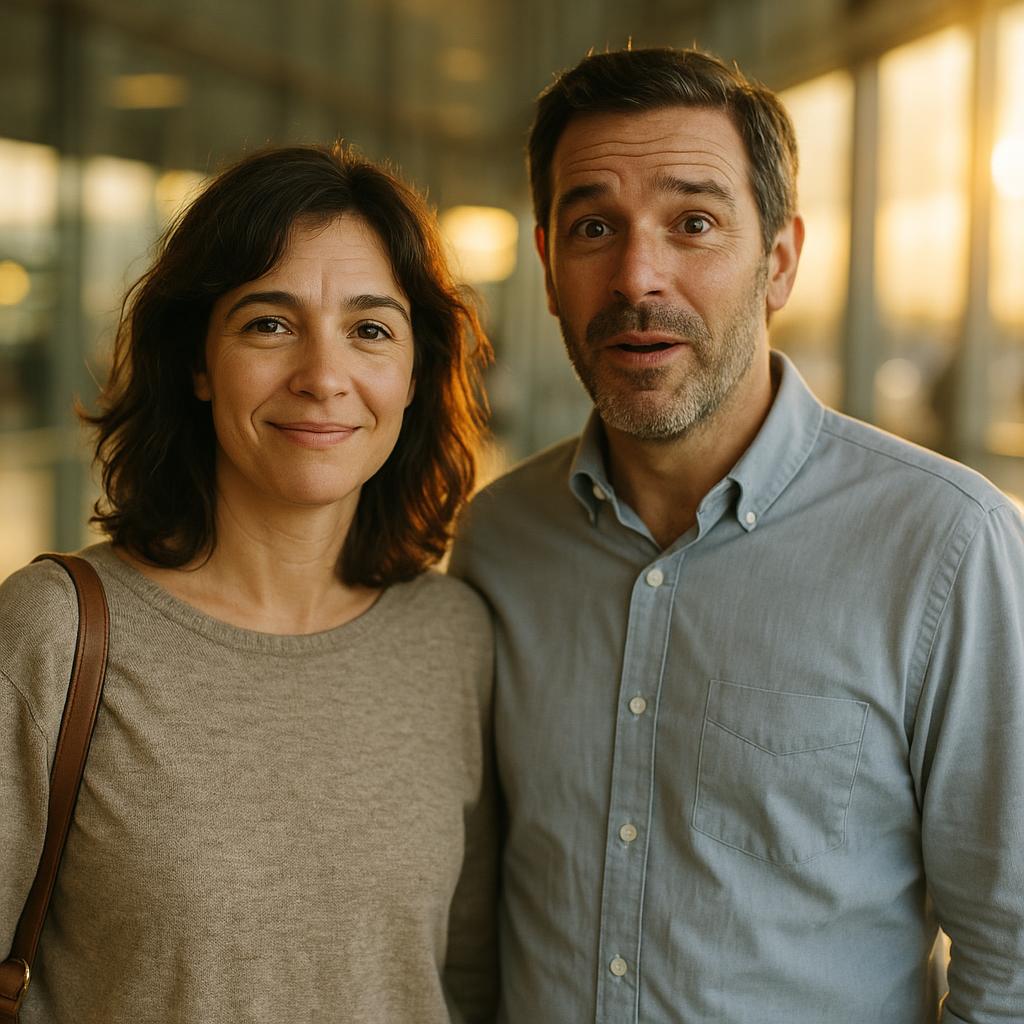 Image by RM AI
Image by RM AI
Planning Take Two
Mom and I spent hours strategizing 'Operation Birthday Redemption' over FaceTime, determined to get it right this time. 'I've already spoken with Skyway's customer relations,' Mom said, scrolling through her emails. 'They're fully on board.' When I called to confirm my booking, the representative's voice changed the moment I mentioned my name. 'Ms. Reynolds? Of course we remember you. We'll ensure everything goes perfectly this time.' It felt surreal having the airline that once humiliated me now bending over backward to accommodate me. As I packed my carry-on, I pulled out my navy blazer—the same one from last year—and smiled at the irony. This time, I wasn't wearing it as armor or to prove I belonged; I was wearing it because I liked how it looked. I stood in front of my mirror, no longer rehearsing explanations or justifications, just a simple 'Surprise, Dad!' The night before my flight, I felt butterflies, but they were different now—excitement rather than anxiety. I texted Dad a casual 'good luck on tomorrow's flight' message, knowing he had no idea I'd be on it. What I didn't anticipate was the special instruction the airline had added to my reservation, visible only to the crew, that would change everything about my experience.
 Image by RM AI
Image by RM AI
Return to the Airport
Walking through the same airport terminal where my humiliation unfolded months ago sends a familiar flutter of anxiety through my chest. I pause at the entrance, taking a deep breath. 'You've got this, Emily,' I whisper to myself. The polished floors and bustling crowds are the same, but I'm different now. I'm no longer the nervous 19-year-old desperate to prove she belongs in first class. As I approach security, I hand over my ID with steady hands. The TSA agent smiles—just a normal, everyday interaction. Nothing special. Nothing suspicious. At the gate, I join the first-class boarding line without hesitation, standing tall between business travelers in suits and a couple in matching Hawaiian shirts. No one gives me a second glance. I'm just another passenger with a valid ticket. When the gate agent calls for first-class boarding, I step forward confidently, boarding pass displayed on my phone. 'Good morning, Ms. Reynolds,' she says after scanning it. 'Enjoy your flight.' Her eyes show no judgment, no suspicion—just professional courtesy. As I walk down the jetway, I realize I'm not clutching my bag like a shield anymore. I'm not mentally rehearsing explanations for why I deserve to be here. I simply am here, and that's enough. What I don't expect is who's waiting to greet passengers at the aircraft door.
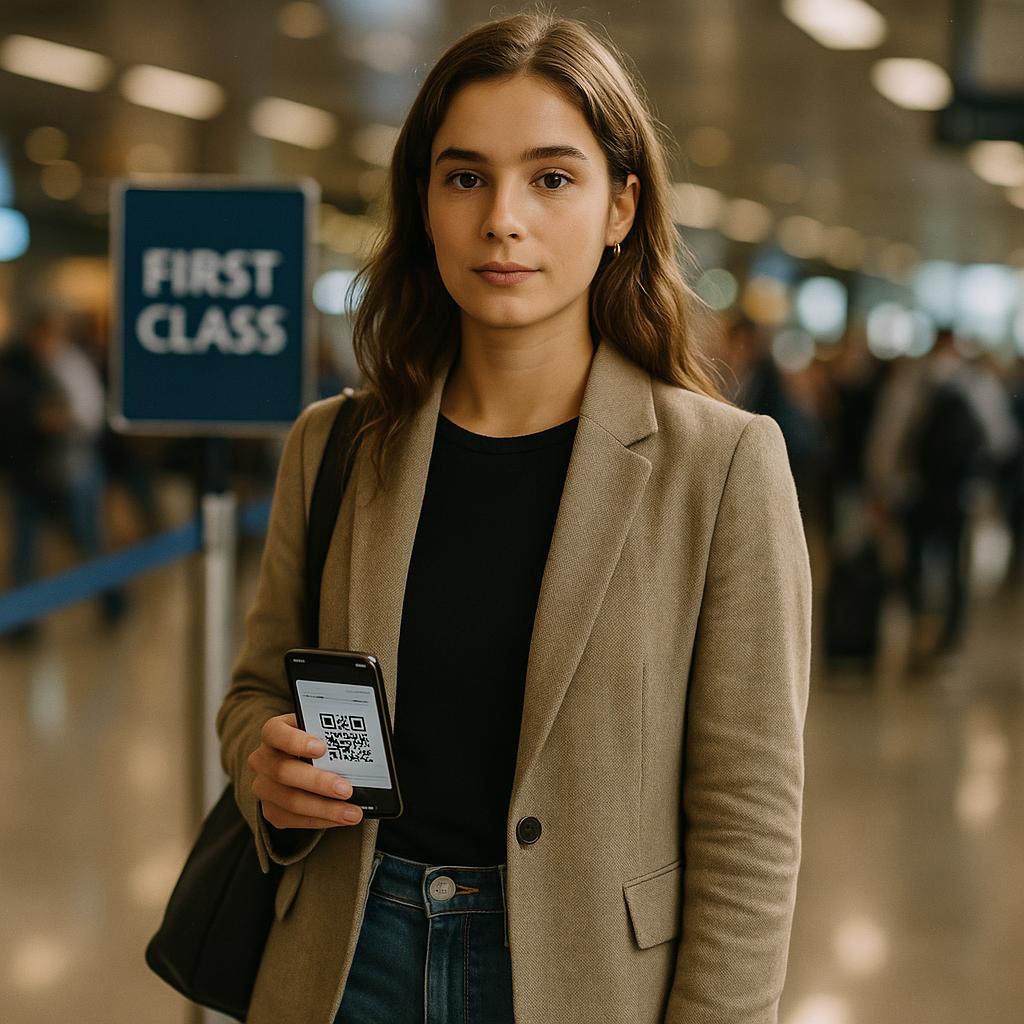 Image by RM AI
Image by RM AI
A Different Welcome
As I stepped onto the plane, I was greeted by a flight attendant with warm, crinkled eyes. 'Welcome aboard, Ms. Reynolds. We're delighted to have you in first class today,' she said with genuine warmth that made my shoulders instantly relax. No narrowed eyes, no suspicious once-over—just the normal courtesy any passenger deserves. I made my way to seat 2A, the same one from my disastrous first attempt, and settled in without the weight of having to justify my presence. The businessman next to me smiled and offered a casual 'Morning!' before returning to his newspaper. No one was staring. No one was whispering. The leather seat felt different somehow—less like forbidden territory and more like simply... my seat. A different flight attendant approached with pre-flight drinks. 'Orange juice or champagne?' she asked, as if I belonged there without question. I chose orange juice and sipped it slowly, savoring not just the drink but the normalcy of the moment. The contrast with my previous experience was so stark it almost made me emotional. This was how it should have been all along—no scrutiny, no humiliation, just respect. As passengers continued boarding, I noticed someone familiar walking down the aisle toward economy, and my heart suddenly skipped a beat.
 Image by RM AI
Image by RM AI
Dad's Surprise
The moment I'd been waiting for finally arrived. Dad emerged from the cockpit in his crisp captain's uniform, greeting passengers with his usual professional charm. I held my breath as he made his way down the aisle, watching his eyes scan the cabin. When his gaze landed on me, the transformation was instant—his professional smile faltered for just a second before blooming into something much more genuine. His eyes widened in disbelief, then crinkled at the corners with pure joy. 'Emily?' he mouthed, maintaining his composure even as emotion flickered across his face. I gave a little wave, my own eyes suddenly misty. He straightened his shoulders, continuing his captain's duties, but not before giving me the subtlest wink that spoke volumes. This time, there was no drama, no confrontation—just the perfect birthday surprise we'd originally planned. The flight attendants, all briefed on our situation, exchanged knowing smiles. One of them discreetly whispered, 'Happy birthday to the Captain,' as she passed my seat. This was exactly how it was supposed to be the first time—me surprising Dad, him being surprised, and everyone else just happy to witness a moment of genuine connection. What I didn't expect was what Dad had planned for me once we reached cruising altitude.
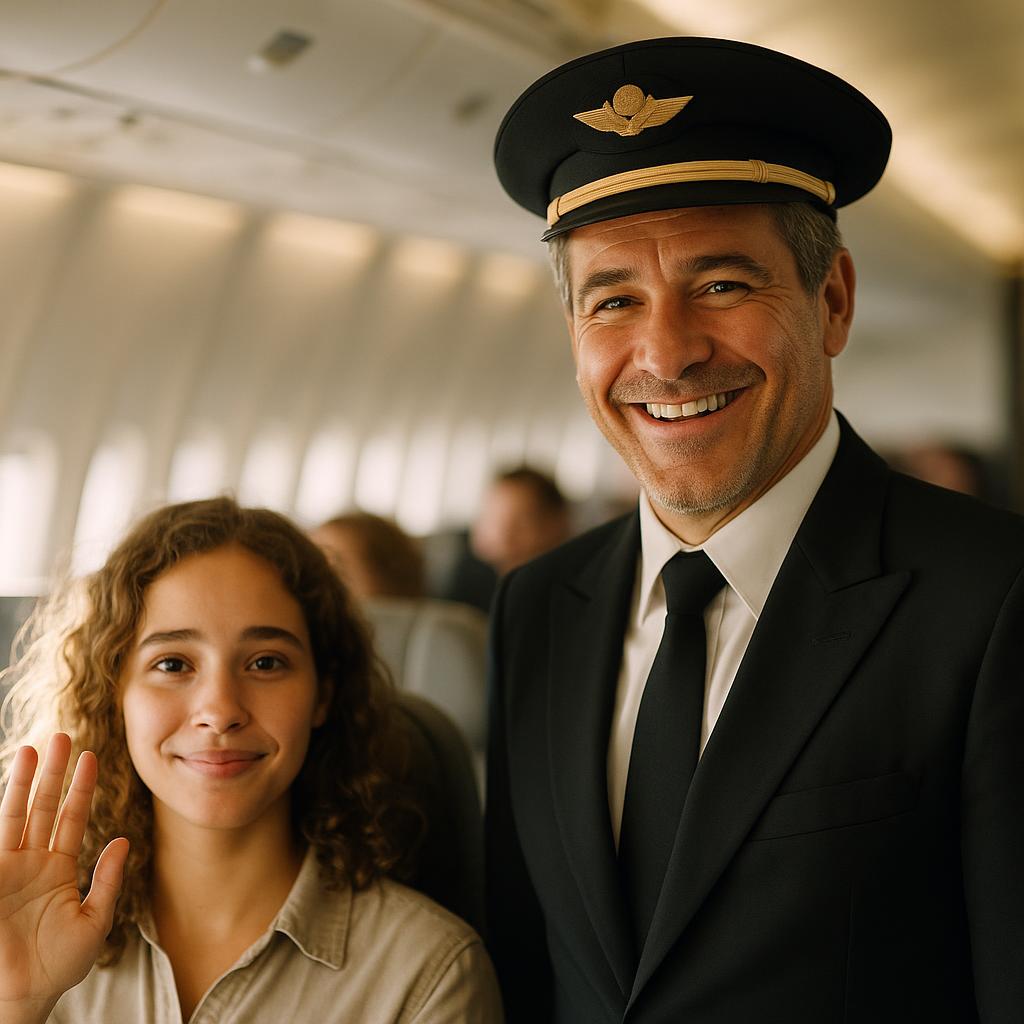 Image by RM AI
Image by RM AI
Mid-Flight Reflection
At 30,000 feet, somewhere between the complimentary warm towels and my second orange juice, I found myself in a strange moment of peace. The gentle hum of the engines provided the perfect backdrop for reflection. Just months ago, in this very cabin, I'd been escorted away in humiliation—a memory that still made my cheeks burn. But look at me now. The same airline, the same seat, yet everything had changed. I watched the flight attendant who'd greeted me so warmly chat with an elderly couple across the aisle. No suspicion, no judgment—just human kindness. My phone held emails from Skyway executives about bias training. My laptop contained research that professors deemed publication-worthy. My experience had sparked conversations in boardrooms and classrooms alike. I wouldn't wish that humiliation on anyone, but I couldn't deny how it had transformed me. I was no longer the girl who apologized for taking up space. Dad was right—knowing you belong is more powerful than having others believe it. As we passed through a patch of turbulence, I gripped my armrest and smiled at the metaphor. Sometimes life's bumpy moments lead to the smoothest revelations. What I didn't know then was that the captain's announcement coming through the speakers would change everything yet again.
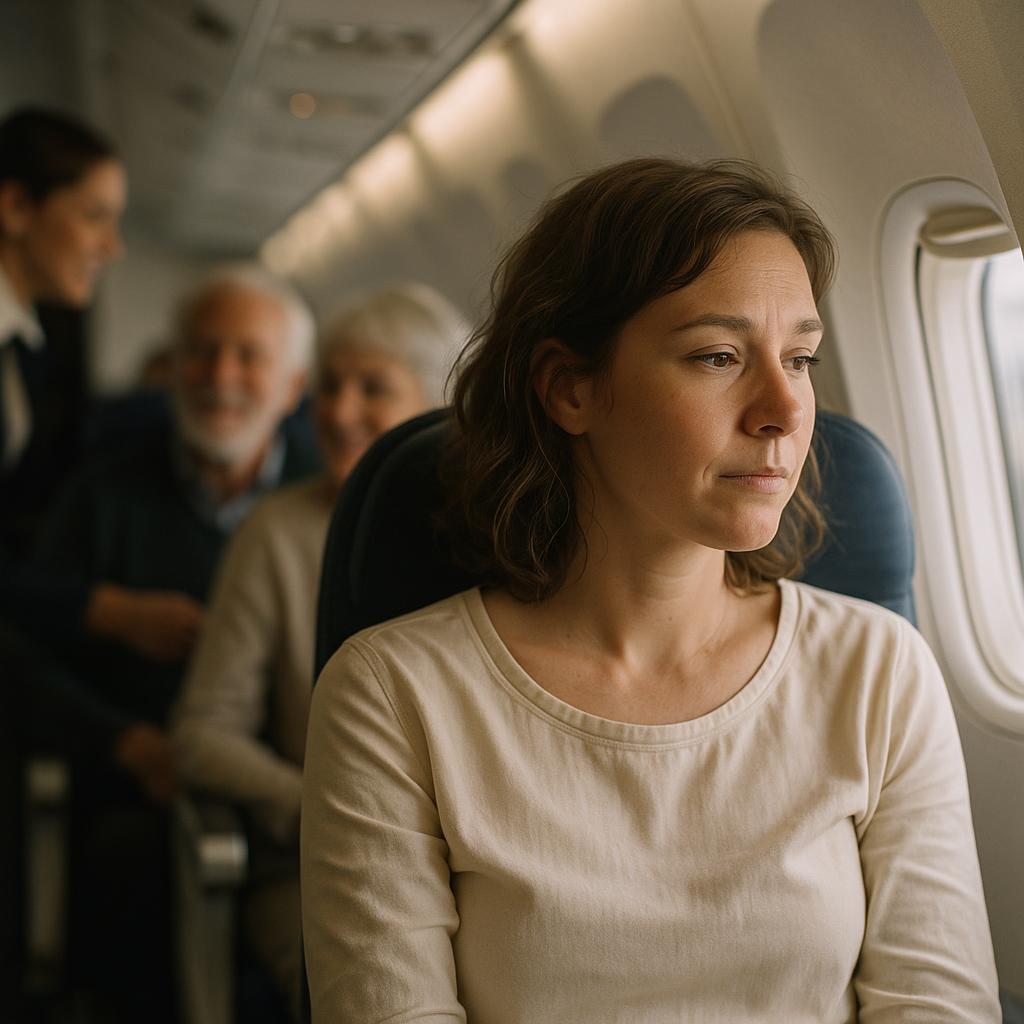 Image by RM AI
Image by RM AI
A Special Announcement
The cabin speakers crackled to life about halfway through our flight. 'Ladies and gentlemen, this is your captain speaking.' Dad's voice filled the cabin, and I smiled, recognizing the slight lift in his tone that meant he was genuinely happy. 'Today happens to be a special day for me. My daughter has surprised me by joining us in first class for my birthday.' A ripple of 'awws' and spontaneous applause spread through the cabin. Several passengers turned to look at me with warm smiles. I felt my cheeks flush, but unlike last time when all eyes on me meant scrutiny and judgment, this attention felt celebratory. The flight attendant who had greeted me earlier gave me a thumbs-up from her position near the galley. 'If you see her, please feel free to wish her a happy birthday too—she's the real gift today,' Dad continued, his voice cracking just slightly with emotion. I sank deeper into my seat, equal parts embarrassed and delighted. The businessman next to me chuckled and said, 'Your dad seems pretty cool.' I nodded, unable to speak past the lump in my throat. This was how it was supposed to be all along—my presence celebrated, not questioned. What I didn't expect was the flight attendant approaching with a bottle of champagne and a mysterious envelope with the airline's logo.
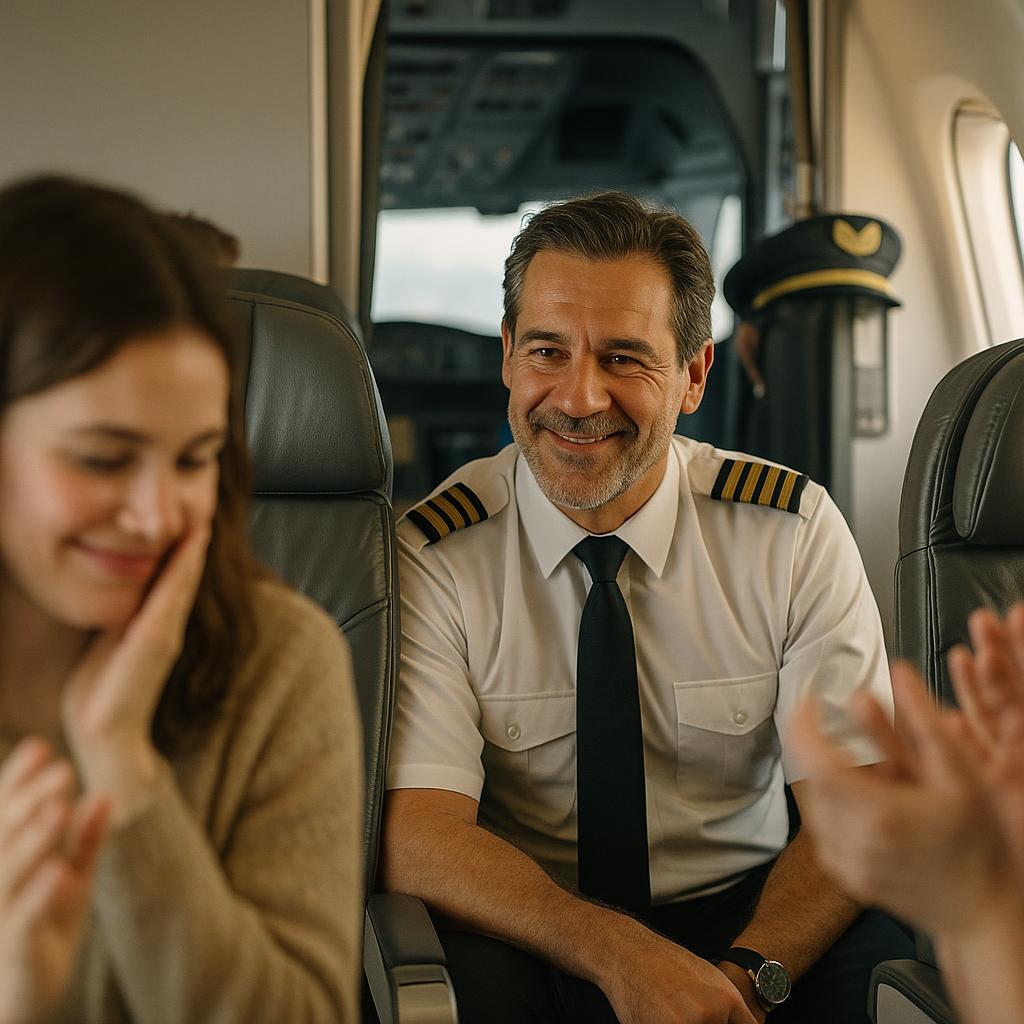 Image by RM AI
Image by RM AI
Landing with Closure
As the plane begins its descent, the lead flight attendant approaches with a small cake topped with a single candle. 'We thought you might like to surprise your dad with this when we land,' she explains, her smile genuine. I stare at the cake, then at the envelope she's placed beside it, tears welling up unexpectedly. It's not just a cake—it's redemption. Last time, I was escorted away in humiliation; this time, the crew is helping me celebrate. 'Thank you,' I manage, my voice barely above a whisper. 'This means more than you know.' She squeezes my shoulder gently before moving on. I run my finger along the airline logo on the envelope, wondering what's inside. The plane dips through clouds, and I watch the landscape below come into focus—just like my own perspective has sharpened over these months. Dad's voice comes through the speakers announcing our final descent, steady and proud. I clutch the cake box, imagining his face when I present it. This flight isn't just transportation; it's closure. A healing counterpoint to what happened before. As the wheels touch down with a gentle bump, I realize something profound: sometimes you have to return to where you were broken to truly understand how well you've healed. What I couldn't possibly know was that the contents of that mysterious envelope would offer me a choice that would change everything.
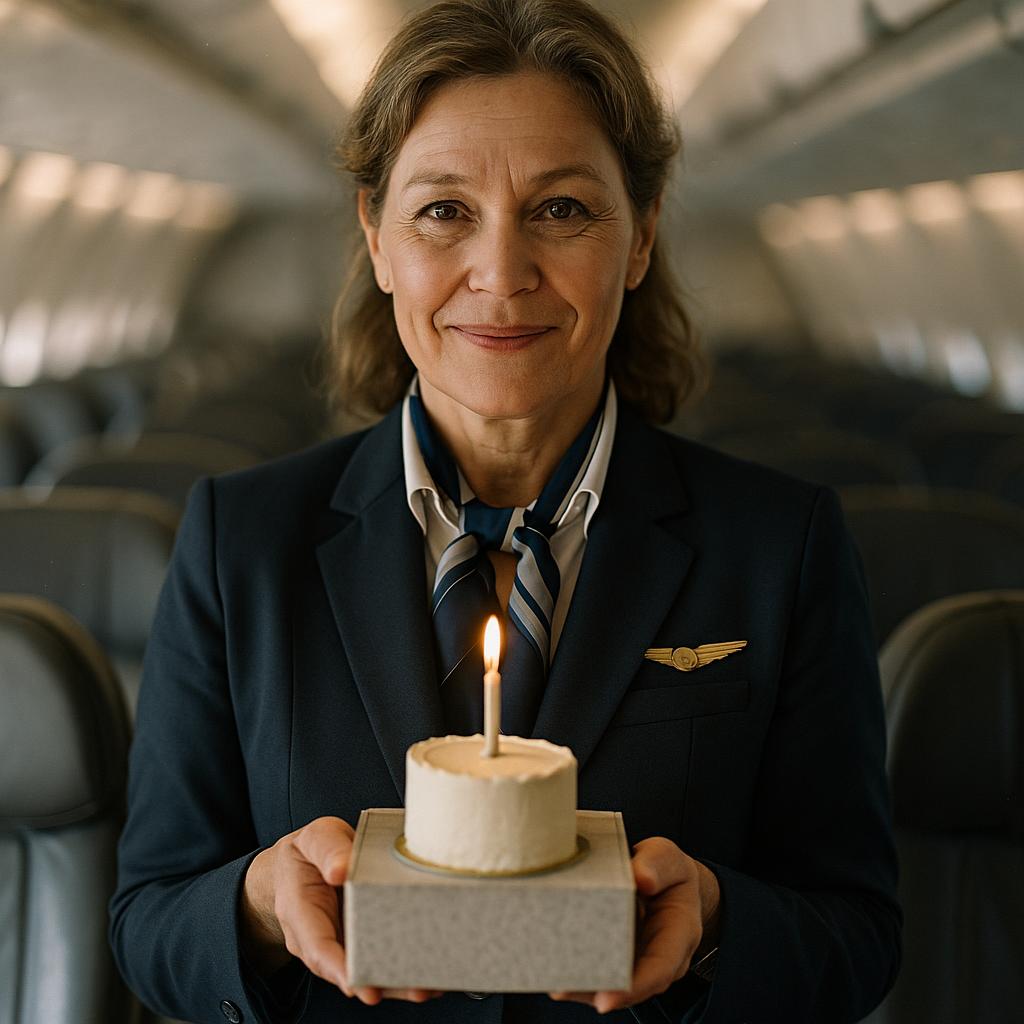 Image by RM AI
Image by RM AI
Celebration at Home
Mom outdid herself with Dad's birthday dinner—pot roast with all the fixings, his absolute favorite. The three of us sat around our kitchen table, candles flickering as we clinked glasses in a proper celebration. 'To second chances,' Dad said, his eyes crinkling at the corners. Between bites of perfectly tender beef, we rehashed both flights—the disaster and the redemption. 'You know,' Dad said, setting down his fork, 'that incident with you actually sparked some major changes at Skyway.' He explained how the airline had implemented new training protocols and revised their customer service guidelines. 'The VP of Operations personally reviewed the case,' he added. 'Sometimes it takes a disruption to create change,' he said, reaching across the table to squeeze my hand. 'I'm proud of how you handled it all, Em.' Mom nodded in agreement, her eyes a little misty. 'You stood your ground without becoming bitter,' she said. 'That's a rare quality.' As we dug into Mom's homemade apple pie, I realized how much I'd grown since that humiliating day. What had started as a simple birthday surprise had somehow turned into something much bigger—not just for me, but for countless other passengers who might never know my name. What I didn't realize was that the envelope I'd received on the plane contained an offer that would put everything I'd learned to the ultimate test.
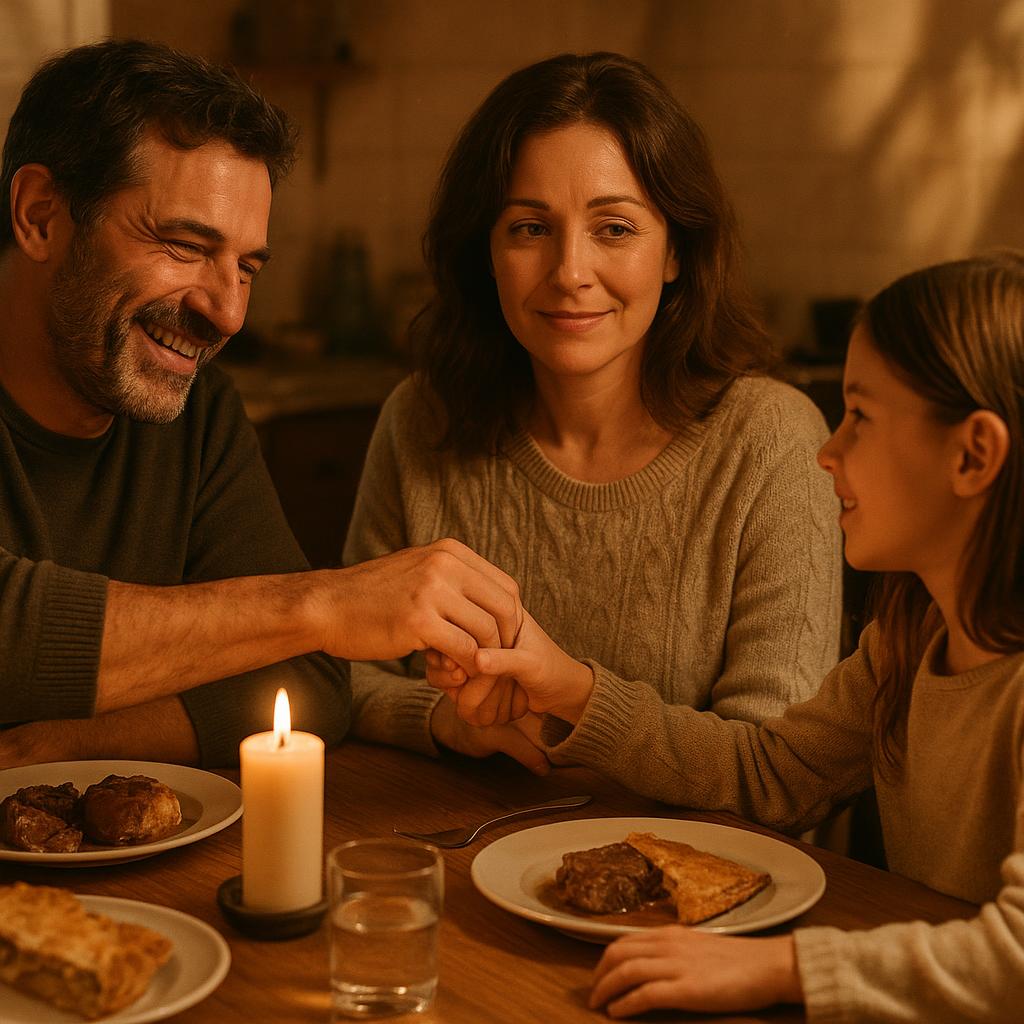 Image by RM AI
Image by RM AI
The Follow-Up Article
I never expected my humiliating airline experience to become the foundation for my writing career, but here I was, hunched over my laptop in the campus coffee shop, putting final touches on my follow-up article. 'From Rejection to Redemption: What Airlines Can Learn About Age Bias' would be featured in next week's campus paper. I'd woven together my personal journey with statistics from my research project, creating something both personal and universal. 'This is excellent, Emily,' Professor Winters said after reviewing my draft. 'You've managed to critique the system without demonizing individuals—that's rare these days.' The response was immediate and overwhelming. My inbox filled with messages from students and faculty sharing similar experiences. 'Your article gave me courage to speak up about how I was treated at that upscale restaurant,' one sophomore wrote. When Professor Winters suggested I submit an expanded version to National Consumer Quarterly for their special issue on service industry bias, I felt that familiar flutter of both excitement and responsibility. 'They're looking for voices with firsthand experience,' she explained, sliding the submission guidelines across her desk. 'Your perspective bridges academic analysis with lived experience.' What I didn't realize was that the editor-in-chief of that publication had a personal connection to Skyway Airlines that would complicate everything.
 Image by RM AI
Image by RM AI
The Airline's New Program
The email from Skyway Airlines arrived six months after my humiliating experience, and I stared at it for a full minute before opening. 'Dear Ms. Reynolds,' it began, 'We are pleased to invite you to speak at the launch of our new Inclusive Service Initiative.' I nearly dropped my phone. The airline that once had me escorted from first class was now asking me to share my story as part of their new training program addressing unconscious bias. According to the email, my experience had been 'instrumental' in reshaping their customer service standards. Mom was ecstatic when I called her. 'See? Sometimes the universe has a way of making things right,' she said. Dad was more measured but proud. 'They're not just saving face,' he told me after speaking with his supervisor. 'Your incident triggered a company-wide review of similar complaints.' Standing at the podium six weeks later, facing a room of flight attendants, gate agents, and executives, I felt a strange sense of closure. 'I'm not here to shame anyone,' I began, my voice steadier than I expected. 'I'm here because sometimes our worst moments can lead to the best changes.' As I described that day—the humiliation, the assumptions made about me based on my age—I watched understanding dawn on many faces. What I couldn't have anticipated was who would approach me after my speech, tissue in hand and a story of her own to share.
 Image by RM AI
Image by RM AI
Unexpected Recognition
As I scanned the audience during my presentation, my heart nearly stopped. There, in the third row, sat Patricia—the flight attendant who had humiliated me months ago. Our eyes met briefly before I forced myself to continue. After I finished speaking about how assumptions can damage customer trust, the crowd dispersed for refreshments. I was chatting with an executive when I felt a tap on my shoulder. 'Emily?' Patricia's voice was softer than I remembered. 'I wanted to thank you for sharing your story.' The awkwardness between us was palpable, but there was something different in her eyes—humility, maybe even respect. She explained she was now part of the airline's employee advisory committee on customer experience. 'Your incident... it made me reflect on how I treat passengers based on appearance.' We didn't hug or exchange phone numbers—this wasn't a Hallmark movie moment. It was brief, slightly uncomfortable, but undeniably important. Later, when I told Dad about our interaction, he nodded thoughtfully. 'That takes courage—from both sides,' he said. 'Most people never face the person they've wronged or the person who wronged them.' I realized then that true resolution isn't always about becoming friends with those who hurt you; sometimes it's just about mutual recognition of growth. What I couldn't have known was how this brief exchange would impact my next major life decision.
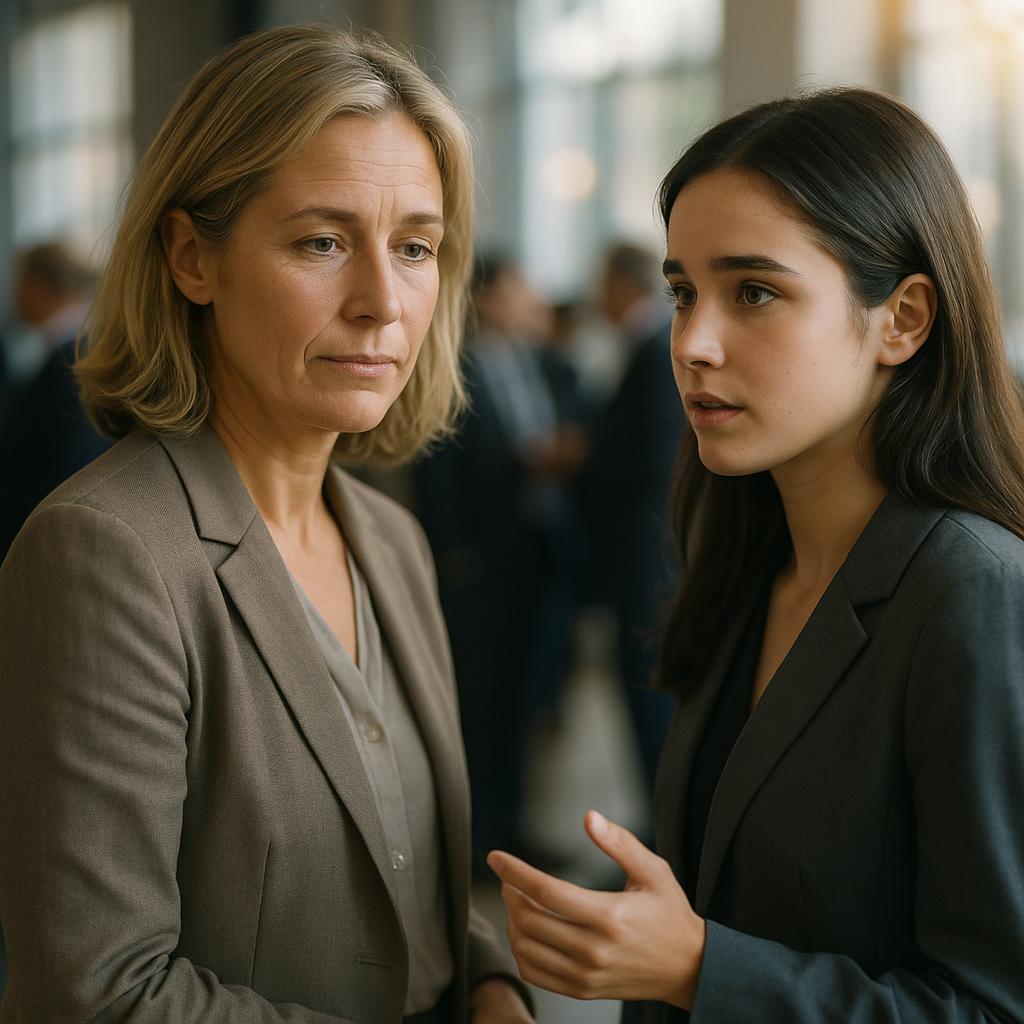 Image by RM AI
Image by RM AI
One Year Later
I was scrolling through my inbox between classes when an unfamiliar name caught my eye. 'Subject: Your Article Changed Everything.' My heart skipped as I opened it. 'Dear Emily,' it began, 'I'm Zoe, 22, from Seattle. Last month, I was asked to move from my premium seat because I "looked too young" to have paid for it.' Her words transported me back to my own humiliation. She continued, 'I remembered your article and instead of slinking away, I stood my ground. I showed them my confirmation and asked for the manager.' The airline not only apologized but upgraded her on her return flight. 'Your story gave me courage,' she wrote. 'Thank you for speaking up when it would have been easier to stay silent.' My hands trembled slightly as I forwarded the email to Dad with a simple message: 'Look what happened.' His reply came minutes later: 'See? This is why it matters.' I stared at those seven words, tears welling up. My story wasn't just mine anymore—it had become a blueprint for others. One small stand against injustice had created ripples I couldn't have imagined. What I didn't realize was that Zoe's email was just the beginning of something much bigger than either of us.
 Image by RM AI
Image by RM AI
Full Circle
It's been exactly two years since that fateful flight, and here I am again, boarding Dad's plane for his birthday. The difference? This time I walk down the jetway with my head high, no rehearsed justifications ready on my lips. "Welcome aboard, Ms. Reynolds," the flight attendant says with genuine warmth. "I loved your article in National Consumer Quarterly, by the way." I thank her, still not quite used to being recognized. As I settle into seat 2A—yes, the exact same one—I notice how different everything feels when you know you belong. The leather seat no longer feels like forbidden territory; it's just a seat I paid for with Dad's miles. When he emerges from the cockpit during boarding and spots me, his face lights up just like I'd imagined that very first time. "You made it a tradition," he whispers, squeezing my shoulder. "Best birthday present ever." What started as a humiliating experience has transformed into something beautiful—a yearly reminder that standing up for yourself matters. As we take off, I can't help but think about all the emails I've received from people who faced similar situations but found their voice because of my story. Sometimes I wonder how many other passengers are sitting in first class today, belonging there without question, because one flight attendant's bias was finally addressed. What I don't realize yet is that someone very important is watching our reunion from just a few rows back.
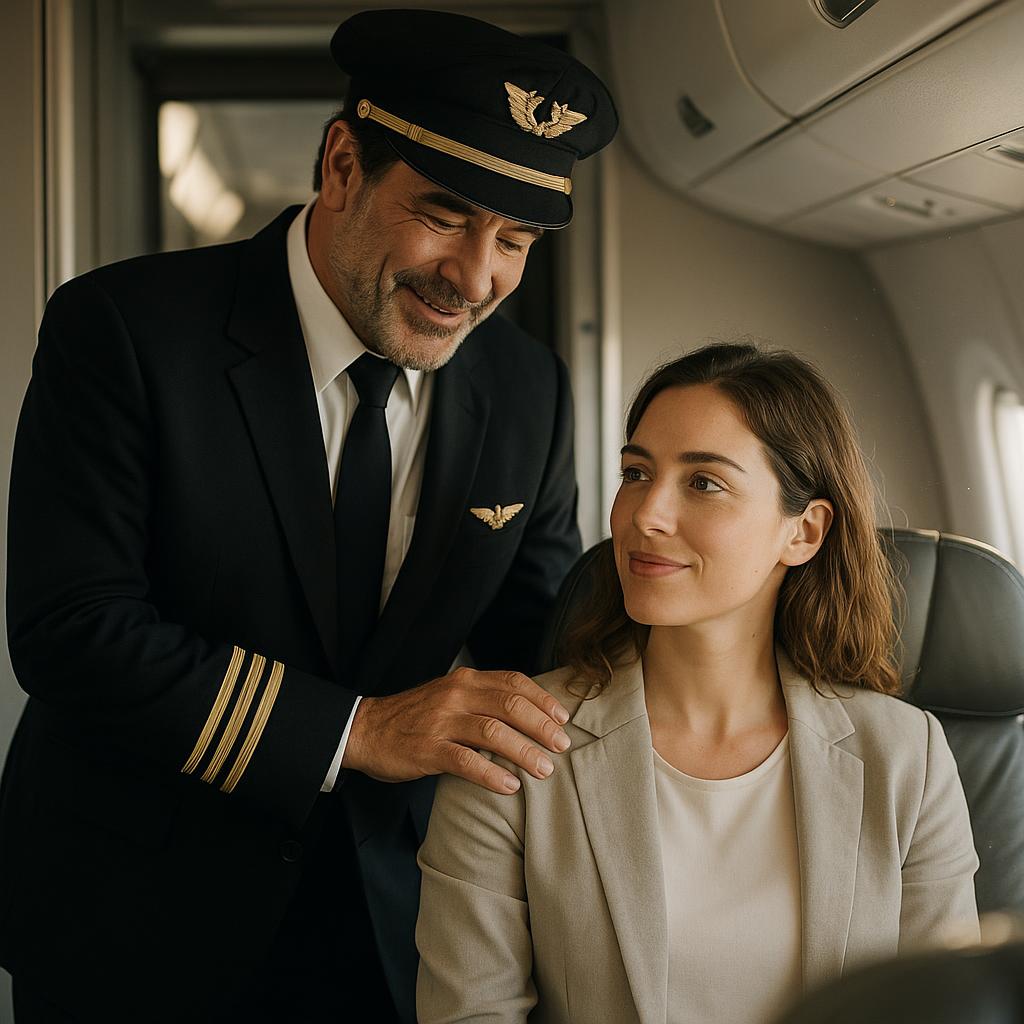 Image by RM AI
Image by RM AI
KEEP ON READING
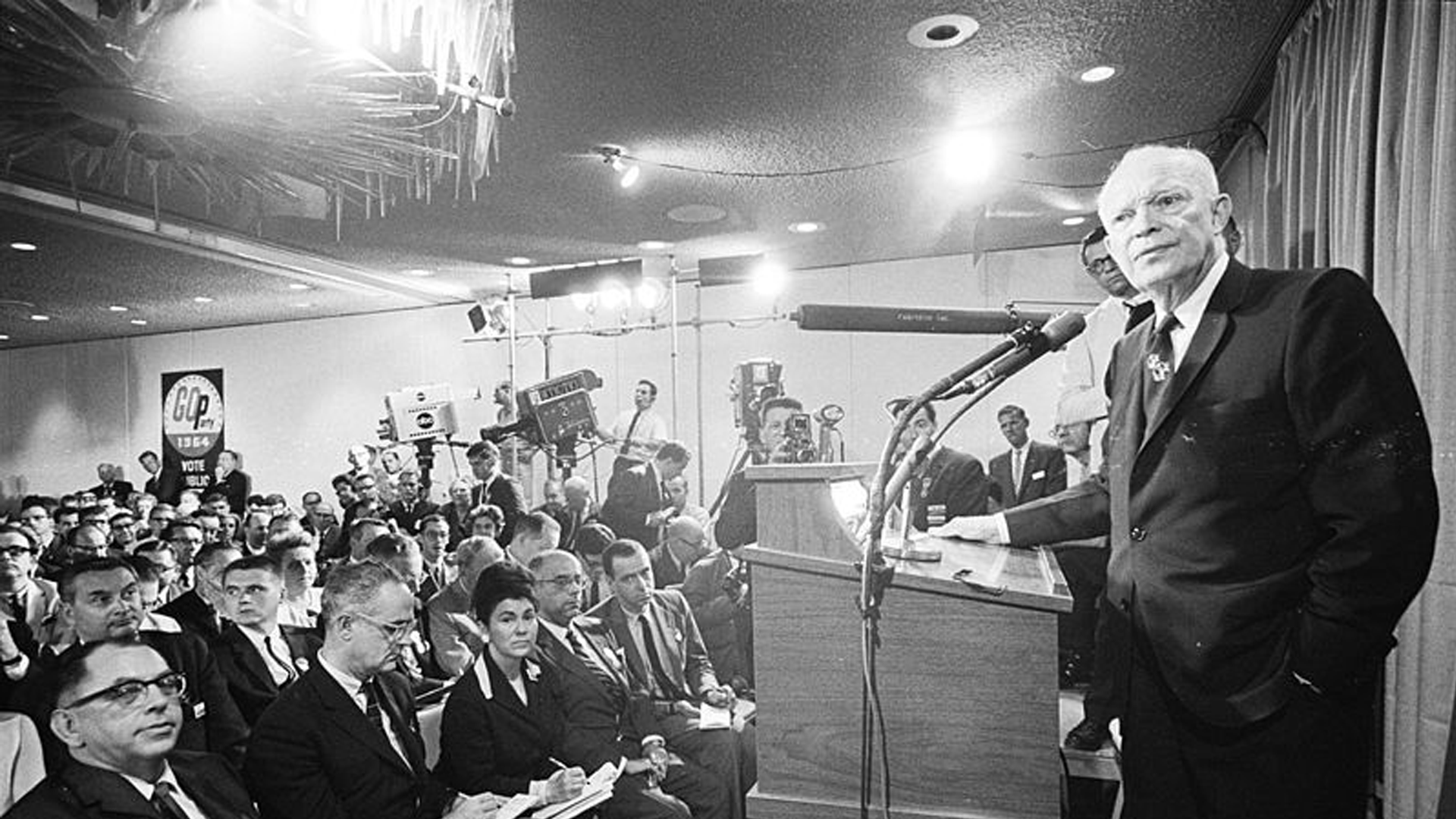
20 Important Names From World War II You Should Know
Key Players From World War II (For Good or Bad).…
By Cathy Liu Nov 7, 2024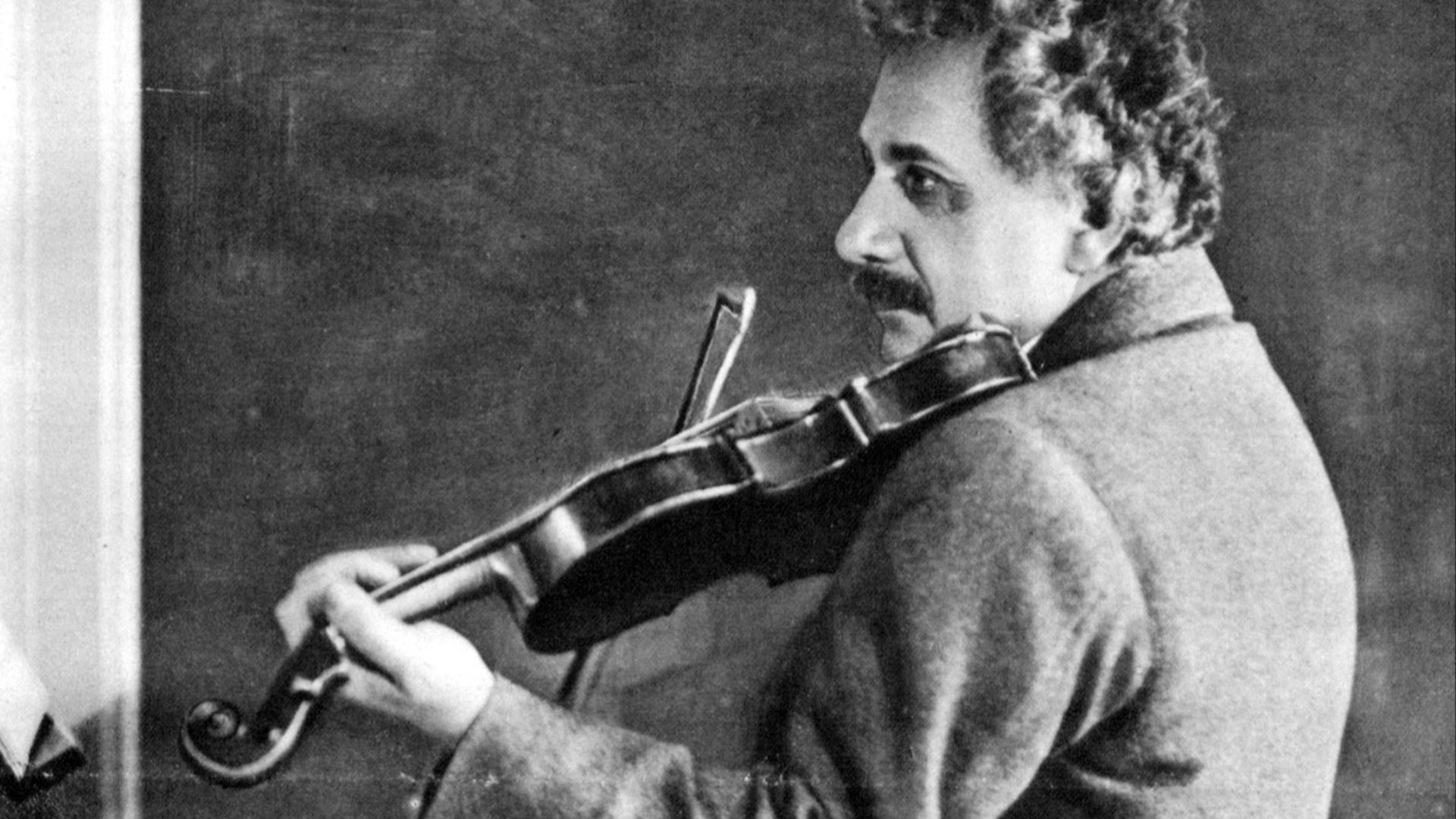
Einstein's Violin Just Sold At An Auction—And It Earned More…
A Visionary's Violin. Wanda von Debschitz-Kunowski on WikimediaWhen you hear…
By Ashley Bast Nov 3, 2025
The History Of Your Favorite Dog Breeds
Hannah Lim on UnsplashFrom vicious wolves to our furry friends,…
By Breanna Schnurr Nov 13, 2025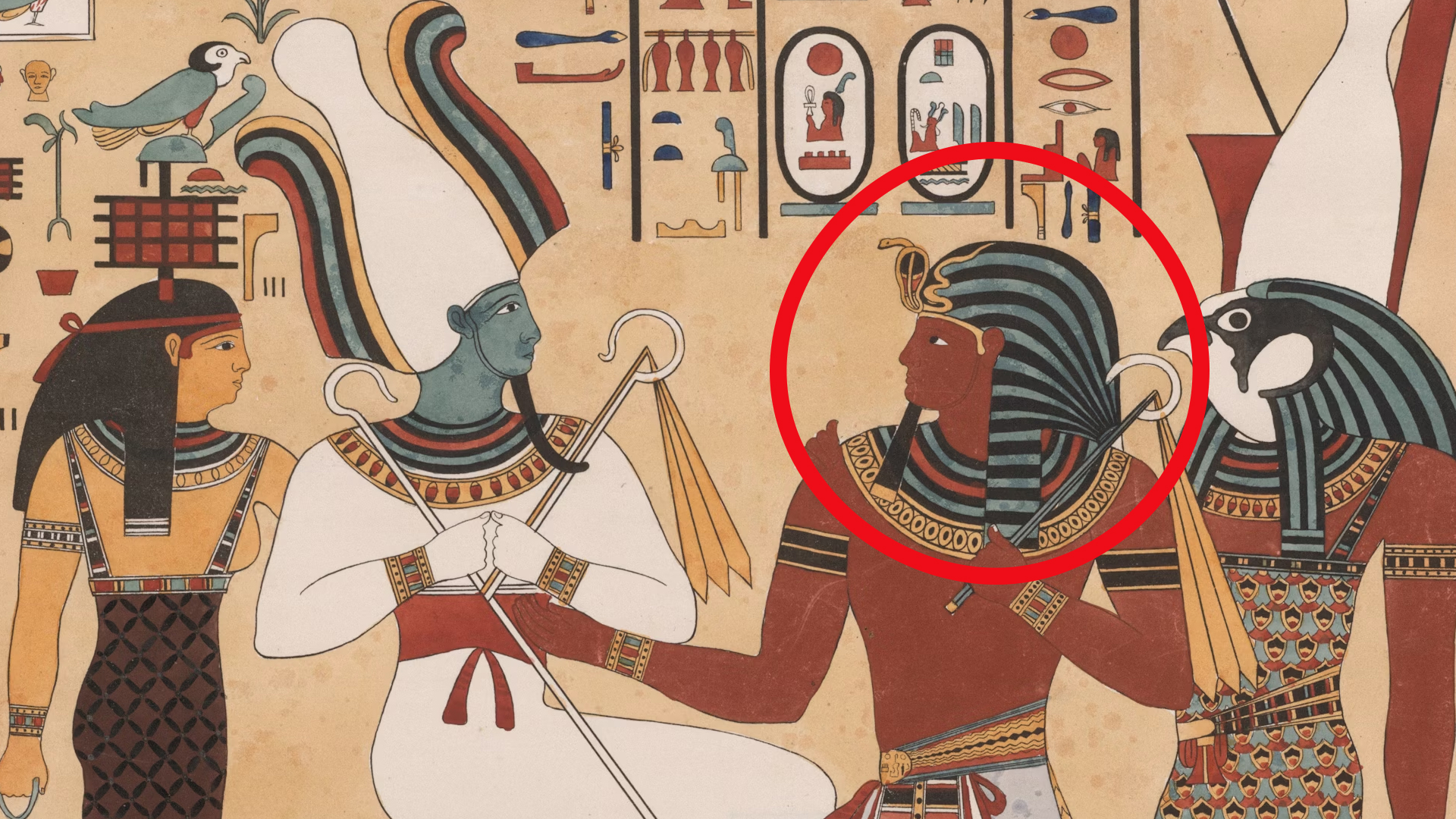
The Mysterious "Sea People" Who Collapsed Civilization
3,200 years ago, Bronze Age civilization in the Mediterranean suddenly…
By Robbie Woods Mar 18, 2025
20 Inventors Who Despised Their Creations
Made It… Then Hated It. Inventors often dream big, but…
By Chase Wexler Aug 8, 2025
20 Incredible Items In The British Museum People Say Were…
Mystery In History. The mighty halls of the British Museum…
By Chase Wexler Sep 8, 2025
